
Embassy of the Republic of Korea in the USA
- Ambassador’s Greetings
- Bidding Notice
- Location/Contact
- Office Hours and Location
- Nationality / Naturalization
- Military Service
- Driver's License
- Bilateral Relations
- About Korea
- Driver's License
- Consular/Visa Service
- Font Size size up size down
Visa Application Forms (Online Reservation for Visit Requested)
! Starting 12/21/2020 all applicants must pre-book an appointment online (Consul 24 ☜click) before they can come in to drop off the application packet in person.
!! Online reservation (DC, VA, MD, WV residents only) Please select “Embassy of Korea in the US” for the selection of the jurisdiction location for your consular service needs.
!!! Appointments can be booked at the following time slots: 9AM-12PM or 3PM-5PM
(Visa applicants are strongly encouraged to book between 9AM-12PM. Afternoon appointments may cause further delays in visa processing.)
□ General Visa Information
Welcome to the Visa Service Section of Embassy of the Republic of Korea in the USA.
** On November 17, 2008, the Republic of Korea joined the U.S. Visa Waiver Program (VWP). As a result, on reciprocity, U.S. citizens can visit the Republic of Korea without a visa for duration of up to 90 days or less if the purpose of the trip is for tourism, business meeting, attendance at a conference or visiting families or relatives. (Extension of stay is not permitted)
A U.S. citizen, who is not qualified with VWP or not eligible to enter to Korea without a visa, is kindly requested to apply for an appropriate entry visa.
A U.S. citizen, who wishes to work, or to engage in profit making activities, is kindly requested to apply for an appropriate entry visa.
For U.S. citizens(only who was Korean or either of your parents/gradparents was Korean), a five year valid multiple entry F-4 Visa is issued. This visa holder can stay up to 2years each time he/she visits the Republic of Korea until their visas expire.
If you are not a resident of one of the states(Virginia, Maryland, District of Columbia, West Virginia), please contact directly other Jurisdiction Korean Consular Office in your area.
For list of the Countries Under Visa Exemption Agreements, more detailed information, visit
http://www.immigration.go.kr/immigration_eng/index.do
www.visa.go.kr/openPage.do?MENU_ID=10102
** Do not require a visa but must apply for K-ETA (Korea Electronic Travel Authorization).
Please refer to the K-ETA -> www.k-eta.go.kr
□ Important Notice:
A person with multiple nationalities who has both Korean nationality and foreign nationality is considered a Korean national, not a foreigner in Korea. The applicant’s visa hereby could be cancelled if he/she is proved to be a Korean national and not be a foreigner anymore even though the visa has been issued from the Korean government. Korean government may ask you to submit additional documents related to you and your parents’ nationality when you apply for a visa to check it.
** Please note that there can be additional documents required by the Consulate after the Consulate reviews your application. Any inconsistencies or false information within the submitted documents may result in visa denial.
Loading. Please wait.
- General Guide
- Application
- Check Application Status
- Immigrant Investor
- Help Center
- Korea Visa Application Center

e-Visa Application via the Visa Portal
Visa application via korean diplomatic missions abroad, confirmation of visa issuance application via the visa portal.
- Confirmation of Visa Issuance Application via Korean Immigration
1. Application Process
Select “Application” >> “E-Visa(Individual)” on the Visa Portal (www.visa.go.kr)
2. Applicant
Application must be submitted by a foreigner or the sponsor on behalf of the foreigner
3. Applicable Status of Stay (as of Dec.8.2014)
- Professor (E-1), Researcher (E-3), Technical Instructor/Technician (E-4), and Professional (E-5) Visa for the applicant and Dependent Family (F-3) Visa for his/her accompanying family members.
- Foreign Notional of Special Ability (E-7) visa for the applicant and Dependent Family (F-3) Visa for his/her accompanying family members. - Qualification : the applicant must be an expert in advanced science and technology and have an official employment recommendation letter (a.k.a. GOLD CARD)
- Short-term General (C-3-1) Visa for a prospective investor invited by a promotion agency of the Immigrant Investor Scheme for Public Business and his/her accompanying family members
- Short-term Group Tourist (C-3-2) Visa for Chinese group tourists who can apply for their Visa through a designated travel agency
- Short-term Medical Tourist (C-3-3) or Recuperation & Treatment (G-1-10) Visa for foreign patients and their caregivers who are invited by an ‘outstanding medical facilitator’ designated as e-Visa agency.
- Qualifications : A foreigner who has entered Korea 3 times or more with a Short-term (C-3) Visa since the implementation of the fingerprint confirmation system for foreigner on Jan. 1, 2012, and who has no history of illegal stay or criminal cases
※ Please refer to the Visa Navigator for more details.
4. Required Documents
- Visa Application Form (electronic form on the Visa Portal)
- Scanned image files of passport pages
- Digital Photograph (in natural color, size: 3.5cm x 4.5cm)
- Fee (credit card for e-Payment)
- Please refer to the guide on required documents for each type of visa on the Visa Navigator or to the Visa Information on the website of a respective diplomatic office.
5. Procedure
Application by the applicant
- 1. Applicant - Completion of Application Form (Visa portal)
- 2. Applicant - e-Payment (Visa portal)
- 3. Applicant - Submission of Application (Visa portal)
- 4. sponsor (corporation/individual) - Confirmation Invitation (Visa portal)
- 5. Visa official - Reception & Review
- 6. sponsor, Applicant - Confirmation of Results (Visa portal)
- 7. sponsor, Applicant - Printing & Sending confirmation of E-Visa Issuance (Visa portal)
- 8. Applicant - Arrival in Korea
Application by the sponsor (inviter)
- 1. sponsor - Login (Visa portal)
- 2. sponsor - completion of Application Form (Visa portal)
- 3. sponsor - e-Payment (Visa portal)
- 4. Visa official - Reception & Review
- 5. sponsor - Confirmation of Results (Visa portal)
- 6. sponsor, Applicant - Printing & Sending confirmation of E-Visa Issuance (Visa portal)
- 7. Applicants - Arrival in Korea (Visa portal)
1. Application process
Select “Application" >> "Confirmation of Visa Issuance” on Visa Portal (www.visa.go.kr)
Application must be filed by the inviter (sponsor)
3. Applicable status of stay (as of Dec.8.2014)
- Professor (E-1), Foreign Language Instructor (E-2), Researcher (E-3), Technical Instructor/Technician (E-4) Professional (E-5) for the applicant and Dependent Family (F-3) Visa for his/her accompanying family members.
- Foreign National of Special Ability (E-7) Visa for the applicant and Dependent Family (F-3) Visa for his/her accompanying family members. - Qualification : the applicant must have an occupation under category 1 (executives) or 2 (professionals or related) of the Standard Classification of Occupation announced by the National Statistical Office
- Short-term Medical Tourist (C-3-3) or Recuperation & Treatment (G-1-10) Visa for foreign patients and their caregivers who are invited by an ‘outstanding medical facilitator’
- Business Visitor (C-3-6) visa for an invitee of a VIP corporation
- Student (D-2) and Korean Language Trainee (D-4-1) visa
- Non-professional(E-9) and Maritime Crew (E-10) visa
※ Please refer to the Visa Navigator for more detail.
- Application form for Confirmation of Visa Issuance (electronic form on the Visa Portal)
- Please refer to the guide on required documents for each type of Visa on the Visa Navigator, or to the Visa information on the board of the respective website of the Diplomatic Office.
- 2. sponsor - Completion of Application Form (Visa portal)
- 3. Visa official - Reception & Review
- 4. sponsor - Confirmation of Results (Visa portal)
- 5. sponsor, Applicant - Download Visa application Form (Visa portal)
- 6. sponsor - Submission of Visa Application & Payment
- 7. Visa Consul - Visa issuance (Diplomatic Office)
6. Check the Result of Your Confirmation of Visa Issuance Application
You can check the result of your application – through “Application Status” via the Visa Portal, ARS (02-2650-6363), text message or e-mail address you gave us.
7. Visa Application
- The sponsor (inviter) must download Visa application form (for the applicant) from “Application Status” on the Visa Portal, and send it to the applicant via email, or inform him/her of the number and expiry date of the confirmation of visa issuance.
- The applicant must receive Visa application form for the confirmation of visa issuance or its number (expiry date) from the sponsor in Korea in order to apply for his/her visa at the Korean Embassy or Consulate General.
Confirmation of Visa issuance is valid for 3 months, and is effective for visa issuance just for once. For any other inquiries, please contact the Immigration Contact center (+1345 without an area code or +82+1345 if you are calling from abroad).
1. Location of Application
Korean Embassy or Consulate in the applicant’s country (or area) of residence.
Application must be submitted by a foreigner or a visa agency on behalf of the foreigner
- A single-entry or multiple-entry visa for eligible applicants of Diplomat(A-1), Government Official(A-2) Visa
- A single-entry visa (with 90 days of duration of stay or less), for eligible applicants of - Short-term News Coverage (C-1), Short-term General (C-3) and Short-term Employee (C-4)
- A multiple-entry visa (with 90 days of duration of stay or less) for eligible applicants of Short-term News Coverage (C-1) and Short-term General (C-3) Visa who are citizens of countries that have multiple-entry visa agreements with Korea.
- Visas issued at the discretion of the head of a Korean diplomatic mission abroad, such as single-entry visa (with 90 days of duration of stay or less) for eligible applicants of Korean Arts and Culture (D-1) Visa who are planning to engage in cultural arts activities upon invitation of the Korea Foundation or from Korean Culture and Arts Committee
※ Please refer to the Visa Navigator for more details
- Visa Application Form (application form No.17, or please click the ‘Application’ menu on the Visa Portal >> Fill out the electronic form)
- Photo (natural color, 3.5cm x 4.5cm)
- You can pay the fee in the currency of your own country only if you receive permission from the head of the Korean diplomatic mission in your country.
The required documents mentioned on the Visa Navigator are of the minimum requirements. Depending on the circumstances of one’s country, the head of the Korean diplomatic mission may request/exempt additional documents for further evaluation. Therefore, in the case that required documents on the Visa Navigator do not match with those of the diplomatic mission, please follow the instructions and requirements provided by the respective diplomatic mission.
- 1. Applicant - Submission of Application
- 2. Visa Consul - Reception & Review (Diplomatic Office)
- 3. Visa Consul - Visa Issuance (Diplomatic Office)
- 4. Applicant - Arrival in Korea
※ For any other inquiries, please contact the consular affair Korean diplomatic missions in your country of residence.
Confirmation of Visa Issuance Application via Korean Immigration Offices
Korean Immigration Office that has jurisdiction over the area of inviter’s residence
2. Applicants
Application must be submitted by a foreigner or the sponsor/agency (E-9, E-10) on behalf of the foreigner
- Long-term Korean Arts and Culture (D-1), Student (D-2), Industrial trainee (D-3), General trainee (D-4), Long-term News Coverage (D-5), Religious Worker (D-6), Intra-company Transferee (D-7), Corporate/Foreign investor (D-8), International Trade (D-9), Professor (E-1), Foreign Language Instructor (E-2), Researcher (E-3), Technical Instructor/Technician (E-4), Professional (E-5), Artists/Athlete (E-6), Foreign National of Special Ability (E-7), Non-professional (E-9), Maritime Crew (E-10), Family Visitor (F-1), Dependent Family (F-3), Miscellaneous (G-1), and Work and Visit (H-2) Visa for eligible applicants
- Long-term Visa for citizens of countries with no formal diplomatic relations with Korea, or just specific countries (i.e. Cuba, Syria, and Macedonia) designated by the Korean government.
- Other people recognized by the Minister of Justice as needed
- Confirmation of Visa Issuance Application Form (Form No.21)
- Photocopy of passport pages
- Photograph (in natural color, size: 3.5cm x 4.5cm)
- The required documents mentioned on the Visa Navigator are of the minimum requirements. The head of the immigration office may request/exempt additional documents for further evaluation.
- The employment certificate and a copy of the representative’s ID, and a letter of attorney are required if the representative applies on behalf of the applicant. (Representative’s application may be restricted when further evaluation is required)
5. Procedures
- 1. sponsor - Completion of Application Form
- 2. Visa official - Reception & Review (Jurisdiction office)
- 3. sponsor, Applicant - Sending Confirmation No
- 4. Application - Submission (Diplomatic Office)
- 5. Visa Consul - Visa Issuance (Diplomatic Office)
- 6. Applicant - Arrival in Korea
6. Notification of evaluation results
7. Visa Issuance
- Terms and Conditions
- Privacy Policy
- Copyright Protection Policy
- Prohibition of Unauthorized Collection of E-mail Address
Building#1, Government Complex-Gwacheon, 47, Gwanmun-ro, Gwacheon-si, Gyeonggi-do, Republic of Korea ( Immigration Contact Center : +82-1345 )
COPYRIGHT©MINISTRY OF JUSTICE. REPUBLIC OF KOREA. ALL RIGHT RESERVED.
※ Visa portal is optimized for IE7, Chrome, Firefox, Safari, Opera browsers and 1024*768 pixels.
Visa Information
Visa and service fees.
- IMPORTANT NOTICES
To check the applicable fees for the type of visa application and services, please click on the relevant topics below.
Visa fees change semi-annually (every 6 months) according to the exchange rate set by the government of the Republic of Korea.
Therefore, the new visa fees will be applied for applications received after JUL 1, 2024 at KVAC and will be valid until DEC 31, 2024.
Please note that all visa fees are set by the Government of the Republic of Korea.
The Korea Visa Application Center (KVAC) is authorized to collect these visa fees on behalf of the Embassy of the Republic of Korea in Berlin.
The visa fees vary, depending on the nationality of the visa applicant.
Please pay the relevant fees for the nationality indicated on your passport. Please find below the visa for the nationalities that are more frequently applying at the KVACs in Europe. For all other nationalities not included below, to verify the applicable visa fees, please check here .
Kindly make sure that you verify the visa fees that apply to your nationality before proceeding with the bank transfer.
[Only for German nationals] The Government of the Republic of Korea has signed reciprocal facilitation and national agreements with Germany to establish the following specific exceptions: Students (all D-2 visa types), Trainee (all D-4* visa types), Intra-Company Transferee (D-7-1 and D-7-2), Corporate/Foreign Investor (all D-8 visa types), International Trade (all D-9 visa types), Foreign National of Special Ability (E-7) engaging in marketing activities are all exempted from visa fees.
*Visa fees for all D-4 visa types are only exempted if the purpose of applying for D-4 visa is to attend courses prior to attending a Korean University from which an applicant already has an admission letter.
[Only for French nationals] Students: The student visa is only for a single entry. Please do not pay the multiple entry visa fee. Working Holiday: Visa fee is exempted when applying for Working Holiday (H1) visas.
The Korea Visa Application Center (KVAC) has been authorized by the Government of the Republic of Korea to collect the service fees listed below.
Bank Information
Bank account holder: INTERNATIONAL ORG. FOR MIGRATION Name of the bank: CITIBANK EUROPE PLC, GERMANY BRANCH IBAN: DE60502109000220043673 BIC: CITIDEFF Address: Reuterweg 16, 60323 Frankfurt Am Main, Germany
Important Notices
- Please be advised that incorrect payments due to mistakes, such as payment of visa fees for a nationality that is not the one of the applicant, will not be refunded. Please ensure to read the website carefully and the page "Visa and Service Fees."
- Regardless of the result of your visa application, if your documents are under review, neither the visa fees nor the service fees will be refunded.
- The required visa and service fees, and optional additional service and related fees must be paid prior to the submission of the visa application. A copy of the proof of payment must be included when submitting your visa application.
- The KVAC will generate a detailed proof of payment listing all services paid for. If you note any discrepancy in regards to your payment, please contact the KVAC team for clarification and/or report the discrepancy to the Embassy of the Republic of Korea in Berlin.
For further information, please visit the website of the Embassy of the Republic of Korea in Berlin and the website of the Korea Visa Portal .
Visa Traveler
Exploring the world one country at a time
South Korea Visa for Tourists in 2024: A Comprehensive Guide
Updated: March 29, 2024
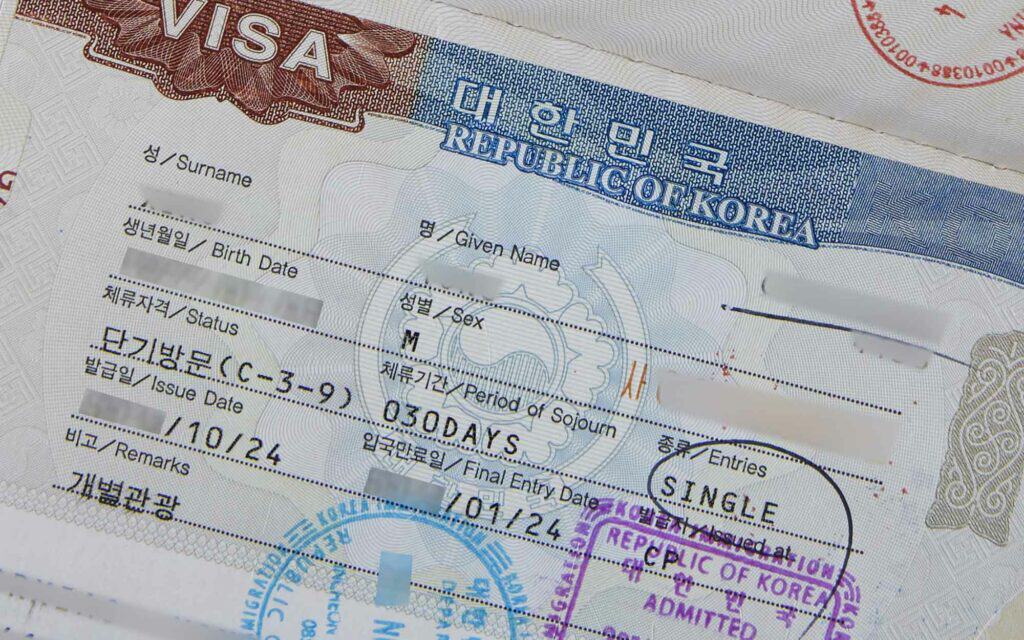
South Korea’s visa policy is generally simple but has a couple of exceptions and specific rules that allow visa-free access where otherwise a visa would be necessary.
The Korean Electronic Travel Authorization (K-ETA) was introduced in September 2021 and is now mandatory for all travelers without visas 18 or older and 65 or younger. This means there is no true visa exemption anymore. However, some nationalities are exempt from the K-ETA until 31 December 2024.
In this article, I will guide you through South Korea visa requirements, K-ETA, tourist visas and exceptions.
Table of Contents
Visa policy and visa types.
Passport holders from 110 countries do not need a visa to travel to South Korea. Unless temporarily exempt, all visa-exempt nationals between 18 and 64 (inclusive) must have a pre-approved K-ETA to travel to South Korea.
There are also various provisions for short-term visa exemptions for other nationalities:
- 30-day visa exemption for holders of visas or residence permits from select countries and in transit to a third country
- 30-day visa waiver for Jeju Island if arriving by direct flight
- 15-day visa exemption for tour groups visiting various regions in Korea
- Tours around Seoul if in transit
In all other circumstances, a tourist visa is required to enter Korea.
South Korea doesn’t issue Visa on Arrival (VOA) or eVisa for tourists.
South Korea Visa Requirements
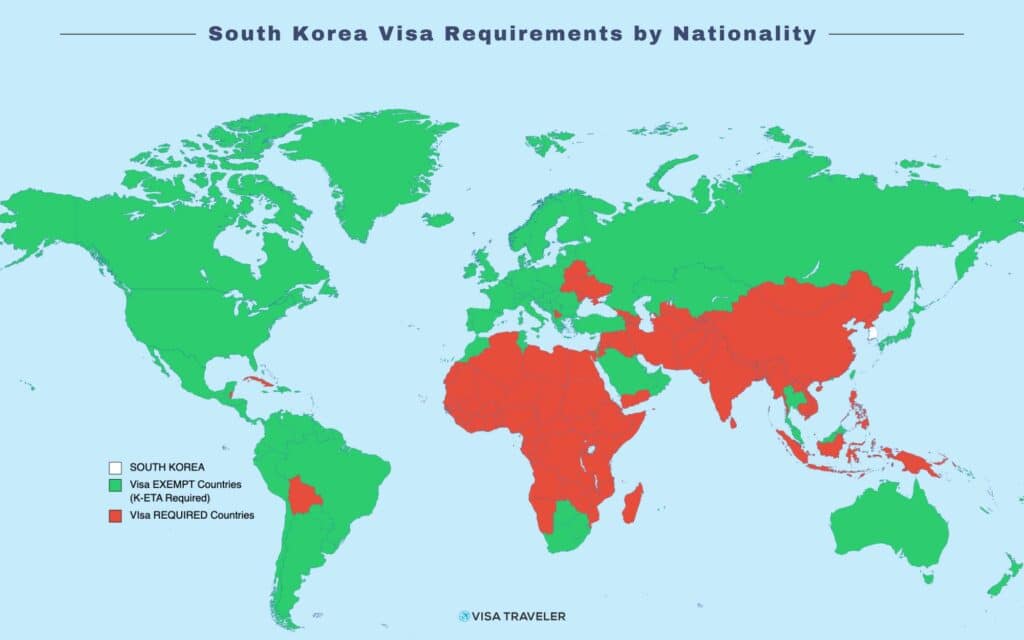
- Passport’s expiry date must be after the intended departure date (no extended validity required)
- Return or onward ticket
- K-ETA if visa-exempt (unless temporarily waived)
Visa Exemption (K-ETA Required)
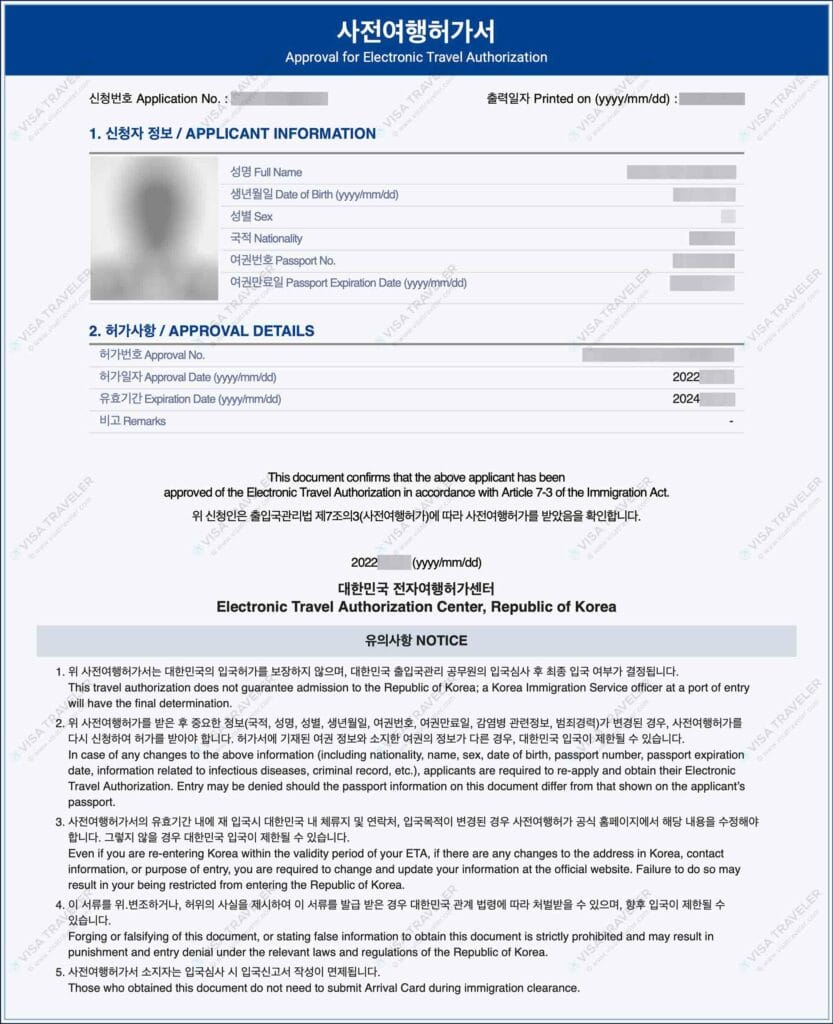
South Korea introduced its form of Electronic Travel Authorization called K-ETA in September 2021. K-ETA is now MANDATORY for all visitors who are exempt from visas. Some nationalities are temporarily exempt until 31 December 2024.
K-ETA eligibility
110 nationalities are visa-exempt. The duration of stay varies from 30 days to 6 months. You must obtain K-ETA before traveling (unless your nationality is exempt until 31 December 2024 ).
- Antigua and Barbuda
- Dominican Republic
- El Salvador
- Liechtenstein
- Netherlands
- New Zealand
- Saint Kitts and Nevis
- Saint Lucia
- Saint Vincent and the Grenadines
- Switzerland
- Trinidad and Tobago
- United Arab Emirates
- United Kingdom
- United States
- Bosnia and Herzegovina
- Kazakhstan #
- Marshall Islands
- Saudi Arabia
- Solomon Islands
- South Africa
- Vatican City
* Total stay must not exceed 90 days within any 180 days # Total stay must not exceed 60 days within any 180 days
K-ETA validity
The K-ETA is valid for 3 years from the date of approval but cannot be longer than the validity of the applicant’s passport.
Applications submitted before 3 July 2023 only received 2-year validity.
The K-ETA costs 10.000 KRW (~8$), payable by card during the online application. A 3% card processing fee is levied, bringing the total to 10.300 KRW.
K-ETA application
You can apply for the K-ETA online on the only official website – the K-ETA Application Portal . Beware of agents and intermediaries posing for official sources.
All you need is your passport, a valid email address, and a debit or credit card.
K-ETA processing time
The processing time of the K-ETA is usually at most 72 hours but can be longer in rare instances.
K-ETA exemption based on age
Everybody younger than 18 years is exempt from the K-ETA. Everybody 65 or older is exempt too.
For more information, read the South Korea K-ETA article for details on the documents required, the application process and current K-ETA exempted countries (until 31 Dec 2024).
Visa Exemption (Jeju Island Visa Waiver)
Jeju Island has its own visa waiver provisions to boost tourism to South Korea’s most popular holiday destination.
Below are the key requirements for Jeju Island visa waiver provision:
- All nationalities except the below 23 are eligible for Jeju Island visa exemption
- Jeju Island visa exemption is valid for 30 days only for the province
- Visitors must enter and depart Jeju via direct flight (i.e. without stopping in any other part of South Korea).
- Visa-exempt but K-ETA-required nationalities must still obtain K-ETA unless temporarily exempt
Ineligible countries
Jeju Island visa exemption is not available for these 23 countries:
- Afghanistan
The above 23 countries also become eligible if they:
- Have a Certificate of Invitation issued by the Jeju Government or Jeju Island Immigration Office (OR)
- Hold a permanent residence permit from Australia, Canada, New Zealand, UK, or USA AND have previously visited South Korea 3 times since 1996 or once since 2006
Visa Exemption (Visa Holders of Third Countries)
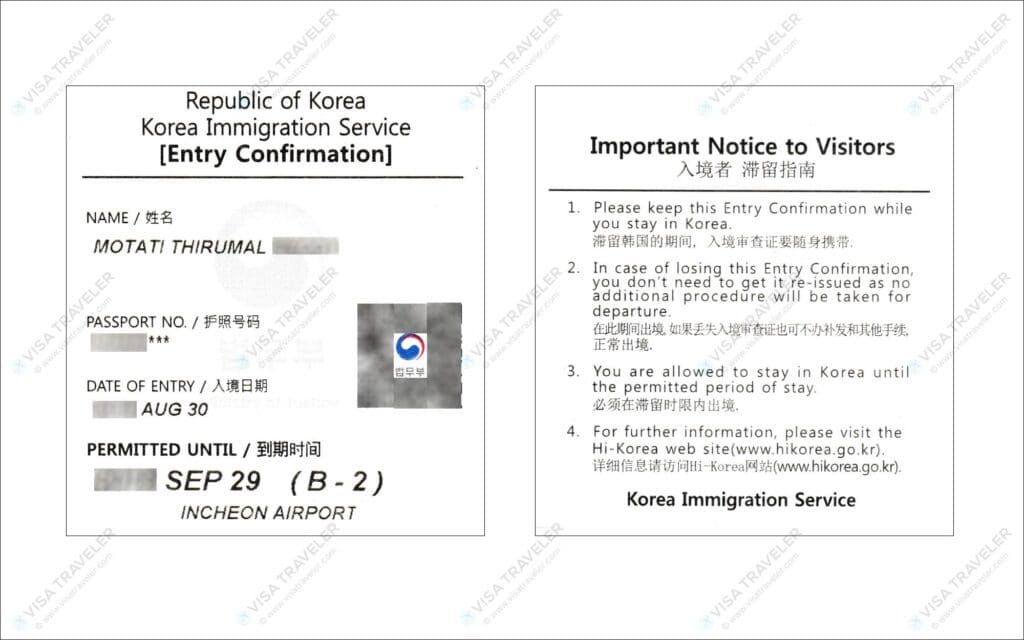
You’re eligible for a 30-day visa exemption if you have a visa or a residence permit from one of the following countries :
You MUST also meet ONE of the following requirements:
- You arrive in South Korea from one of these countries and depart for a third country
- You arrive in South Korea from a third country and depart to one of these countries
- You arrive in South Korea from one of these countries and have transited in a fourth country for less than 72 hours before entering South Korea. You then depart for a third country.
- You arrive in South Korea from a third country, then depart for one of these countries, and will transit to a fourth country for less than 72 hours.
Visa Exemption (Transit Tours at Seoul’s Incheon Airport)
If you’re in transit at Seoul’s Incheon International for less than 24 hours (which is the limit anyway), you’re eligible for any of the free tours around Seoul.
The tours range in price from free to $150 golf courses although most are cheaper than $5. They range from 1 hour to 5 hours in duration.
You can check out the tours and book online via the Incheon Airport website .
Upon arrival, go to the Information desks at either terminal to get routed to your tour.
If you’re from a visa-exempt country but require K-ETA, you must still obtain K-ETA (unless temporarily exempt) for transit tours at Incheon Airport.
The following 23 countries are not eligible for transit tours:
Visa Exemption (Tour Groups)
Various visa exemptions exist for organized tour groups.
Gangwon-do Region
A 15-day visa exemption for Gangwon-do and Seoul Metropolitan Area is available to tour groups from:
- Philippines
This is only if flying in and out of Yangyang International Airport until May 30, 2024.
Jeollanam-do, Jeollabuk-do, Jeju-do Regions
A 15-day visa exemption for these regions is available to tour groups from:
This is only if flying in and out of Muan International Airport until March 31, 2024.
Traveling to Jeju via Seoul, Busan, Cheongju, Muan, or Yangyang
This exemption is only available to Chinese tour groups.
It allows stays on the mainland of South Korea for up to 5 days followed by up to 15 days on Jeju Island.
Tourist Visa from the Embassy
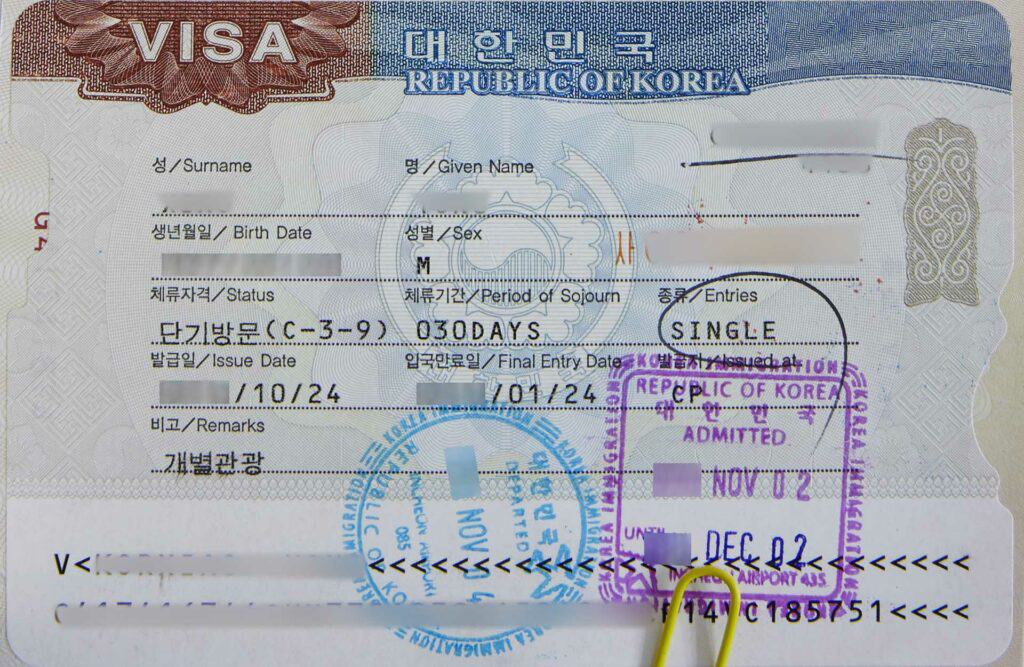
Visitors seeking a tourist visa must obtain it from a South Korean embassy. None of the available e-visas are for short-term tourism visits.
The standard visa for tourism is C-3-9 (Ordinary Tourist).
Requirements
- Visa Application Form #17 (fill it out online)
- Passport valid for the duration of stay
- A standard-size color photo
- Proof of enough funds for the duration of stay in Korea
- Complete Visa Application Form online
- Submit and pay
- Receive an invitation for the interview
- Visit the chosen embassy and conduct the interview
- Check results online
- Download and print visa.
For more information, read the South Korea tourist visa article for details on visa validity, documentation, fee and application procedure.
Benefits of South Korea tourist visa
South Korea visa may not be the strongest, but it does come with VISA-FREE access to a handful of countries. In 2024, you can travel to about 8 countries with a South Korean visa. Read the article on VISA-FREE countries for South Korea visa for more details.
Transit Visa
If you’re not leaving the airport’s transit zone (i.e. not clearing immigration) you do not need a visa or a K-ETA under the condition that:
- Incheon Airport (Seoul): You depart within 24 hours;
- All other airports: You depart on the same calendar day.
If you will be passing through immigration, you must obtain a transit visa, K-ETA or utilize visa exemption as part of one of the transit tours.
South Korea Arrival Card
Tourists arriving in South Korea have to fill out and submit an arrival card. This is a standard procedure in many countries and chances are that you will be given a card already in the airplane.
If you hold a K-ETA, you’re automatically exempt from having to complete and submit an arrival card.
Frequently Asked Questions (FAQs)
Should i apply for k-eta for my children.
Provided your children are 17 years old or younger, it is not necessary to apply for K-ETA for them.
Should I apply for K-ETA if I have a tourist visa?
No. If you have a visa for South Korea you don’t need to submit K-ETA. The K-ETA is only for visa-exempt nationalities.
Do I need a new K-ETA for every visit to Korea?
No. The K-ETA is valid for 3 years from the date of issue. As long as it’s valid, you don’t need to apply for a new one.
Do I need a K-ETA to travel to Jeju Island?
Yes. Even though Jeju has special visa waivers, you still need to submit a K-ETA.
How much money should I have when I apply for a South Korean tourist visa?
Embassies do not disclose this information and it depends. Travelers have been saying that you need to have a minimum of 150$ per day in your bank account.
Do I need proof of COVID vaccination or a COVID test before traveling to South Korea?
Currently, South Korea does not require any COVID-19 vaccination certificates, testing, or quarantine for entry.
WRITTEN BY THIRUMAL MOTATI

Thirumal Motati is an expert in tourist visa matters. He has been traveling the world on tourist visas for more than a decade. With his expertise, he has obtained several tourist visas, including the most strenuous ones such as the US, UK, Canada, and Schengen, some of which were granted multiple times. He has also set foot inside US consulates on numerous occasions. Mr. Motati has uncovered the secrets to successful visa applications. His guidance has enabled countless individuals to obtain their visas and fulfill their travel dreams. His statements have been mentioned in publications like Yahoo, BBC, The Hindu, and Travel Zoo.
PLAN YOUR TRAVEL WITH VISA TRAVELER
I highly recommend using these websites to plan your trip. I use these websites myself to apply for my visas, book my flights and hotels and purchase my travel insurance.
01. Apply for your visa
Get a verifiable flight itinerary for your visa application from DummyTicket247 . DummyTicket247 is a flight search engine to search and book flight itineraries for visas instantly. These flight itineraries are guaranteed to be valid for 2 weeks and work for all visa applications.
02. Book your fight
Find the cheapest flight tickets using Skyscanner . Skyscanner includes all budget airlines and you are guaranteed to find the cheapest flight to your destination.
03. Book your hotel
Book your hotel from Booking.com . Booking.com has pretty much every hotel, hostel and guesthouse from every destination.
04. Get your onward ticket
If traveling on a one-way ticket, use BestOnwardTicket to get proof of onward ticket for just $12, valid for 48 hours.
05. Purchase your insurance
Purchase travel medical insurance for your trip from SafetyWing . Insurance from SafetyWing covers COVID-19 and also comes with a visa letter which you can use for your visas.
Need more? Check out my travel resources page for the best websites to plan your trip.
LEGAL DISCLAIMER We are not affiliated with immigration, embassies or governments of any country. The content in this article is for educational and general informational purposes only, and shall not be understood or construed as, visa, immigration or legal advice. Your use of information provided in this article is solely at your own risk and you expressly agree not to rely upon any information contained in this article as a substitute for professional visa or immigration advice. Under no circumstance shall be held liable or responsible for any errors or omissions in this article or for any damage you may suffer in respect to any actions taken or not taken based on any or all of the information in this article. Please refer to our full disclaimer for further information.
AFFILIATE DISCLOSURE This post may contain affiliate links, which means we may receive a commission, at no extra cost to you, if you make a purchase through a link. Please refer to our full disclosure for further information.
MORE VISA GUIDES

UNITED KINGDOM

VIEW ALL VISA GUIDES
- Cookie Policy
- Copyright Notice
- Privacy Policy
- Terms of Use
- Flight Itinerary
- Hotel Reservation
- Travel Insurance
- Onward Ticket
- Testimonials
Search this site
- Skip to primary navigation
- Skip to main content
- Skip to primary sidebar

South Korea Travel Requirements: Korean Visa or K-ETA?
Last Updated: Jun 16, 2024 by Max · This post may contain affiliate links · Leave a Comment
Whether planning a trip to South Korea or getting ready for a layover in Incheon Airport , it's important to understand the travel requirements for visiting Korea.
Before you book your ticket, make sure all of the necessary documents are in check, including a K-ETA or visa for Korea. In this post I discuss the important travel requirements for South Korea to make your trip planning a lot smoother.
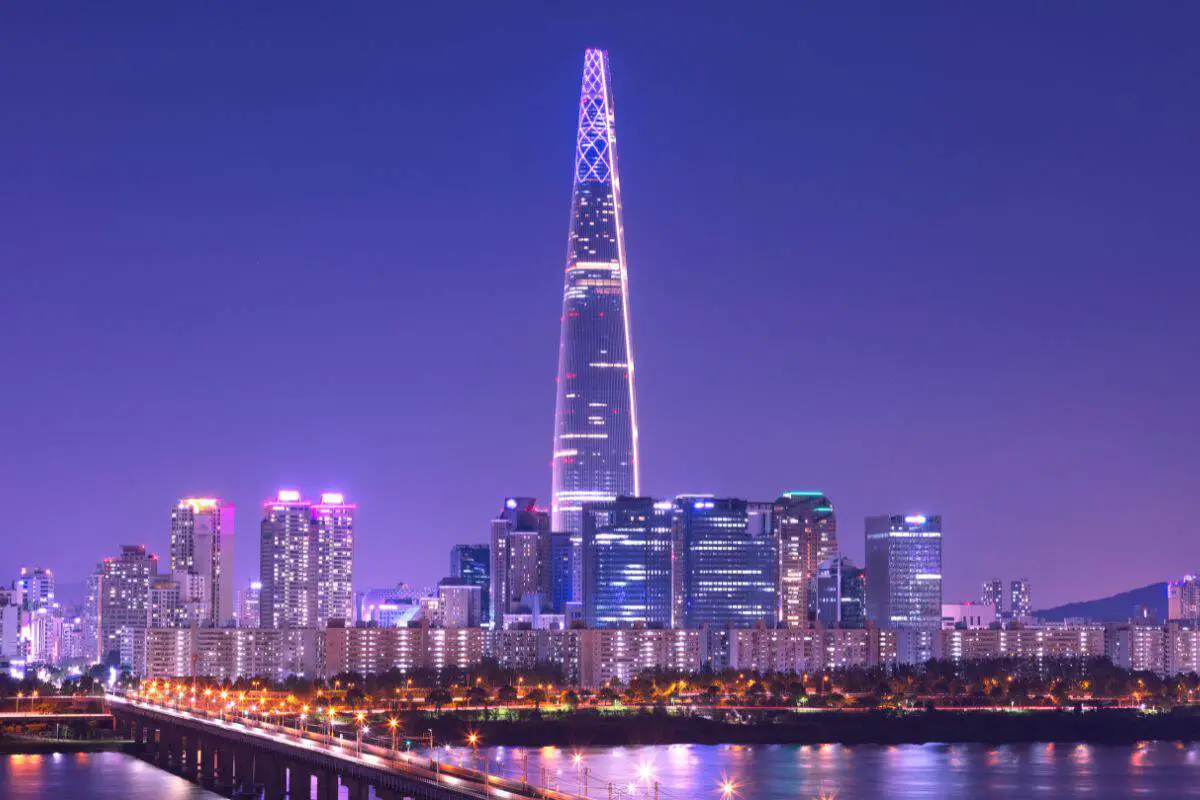
✈️ Basics of Travel in South Korea
📝 south korea entry requirements, ✍️ how to apply for k-eta: step-by-step, 🚌 public transportation and safety, ✅ travel advisory and checklist , 🙋 frequently asked questions.
Visa: Most travelers will need a K-ETA ( Korean Electronic Travel Authorization ), applied for at least 72 hours before departure. If you needed a visa before, you'll need a K-ETA now. Note that from April 1, 2023, to December 31, 2024, passport holders from 22 countries, including the US, UK, Canada, and several EU nations, can visit visa-free – no K-ETA required!
Currency: South Korean won ( KRW or ₩ )
Arrival in Korea: all international flights arrive at Incheon Airport (ICN), one of the best-rated airports in the world. It usually takes about 1 hour to get through security & pick up checked bags.
Getting Around: Korea has an extensive & reliable public transport system. A refillable T-Money card is your ticket to buses and trains across the country; you can buy and refill yout TMoney card at any subways station or convenience store in Korea.
Internet & SIM Cards: Rent a Wi-Fi egg or purchase a prepaid Korean SIM card at the airport, available for up to one month of connection.
Travel Insurance: always recommended, though some credit card companies offers limited coverage when booking.

Visa Categories and Conditions
When you plan a trip to South Korea, you must be aware of the various Korean visa categories and conditions. Each South Korean visa category differs depending on the purpose and duration of one’s stay, but the most common categories are for tourist, business, and student visas.
Most foreigners I encountered when living in Korea happened to be citizens of a primarily English-speaking country (like Australia, Canada, England, Ireland, New Zealand, South Africa, and the U.S.A.) who have an E-2 visa.
This visa lets you stay in the country to teach English for 13 months - if you’re curious about teaching English in Korea and want to know more, please visit the English Program in Korea (EPIK) website.
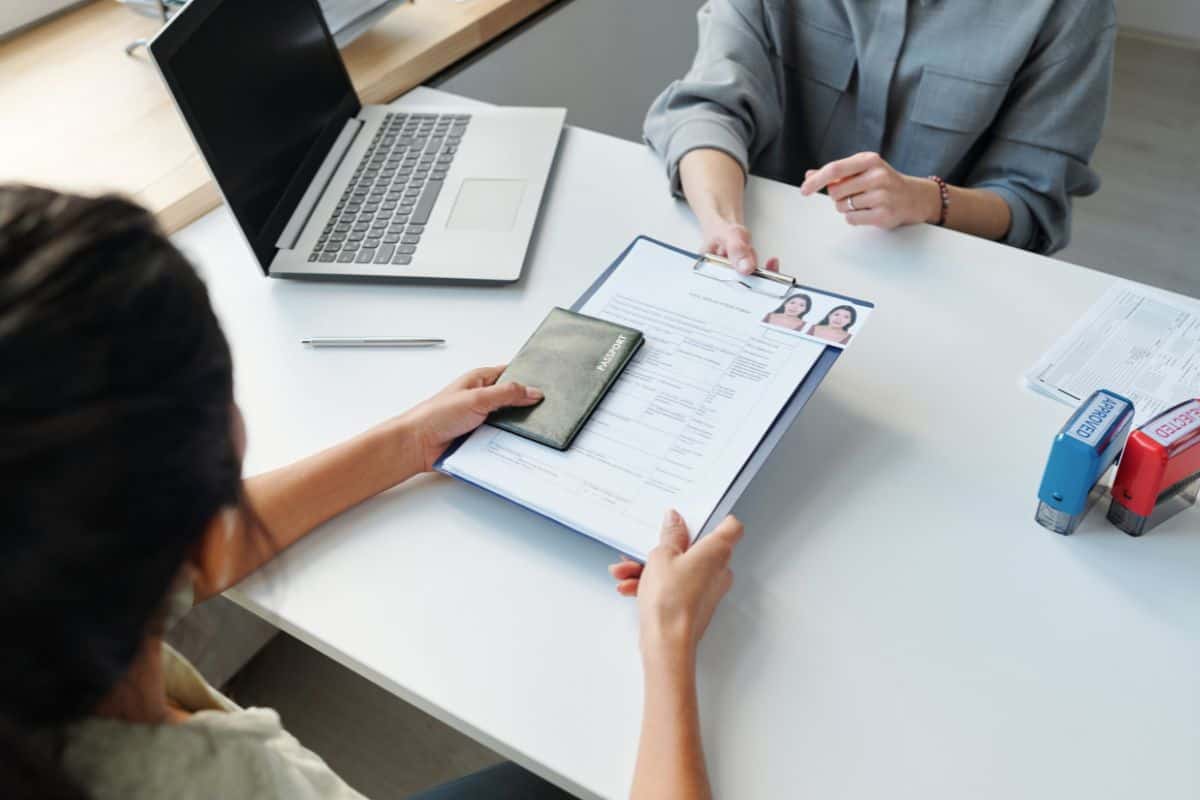
Korean Electronic Travel Authorization (K-ETA)
A Korean Electronic Travel Authorization (K-ETA) may be required for some nationalities, and a visa is needed for others. To check your eligibility and find out how long you can stay in South Korea, please use the official K-ETA Application Eligibility Guide .
Make sure to apply for a K-ETA at least 72 hours (or even earlier) before travel. Most travelers recommend acquiring this as soon as possible because it may take a while to process, or you may need to reapply, though one month in advance is generally enough time.
Visa-Free Travel and Visa Waiver Countries
For some nationalities, visa-free travel to South Korea is possible under specific conditions. If you come from a designated visa-free or visa-waiver country, you may enter South Korea without a visa for short-term tourism or business purposes .
Still - this benefit doesn’t exempt you from the K-ETA requirement, so be sure to secure one before you arrive in South Korea.
Note: Always check the current visa policies for your specific nationality before making your travel arrangements . For a list of South Korea’s visa-free countries, please refer to this site .
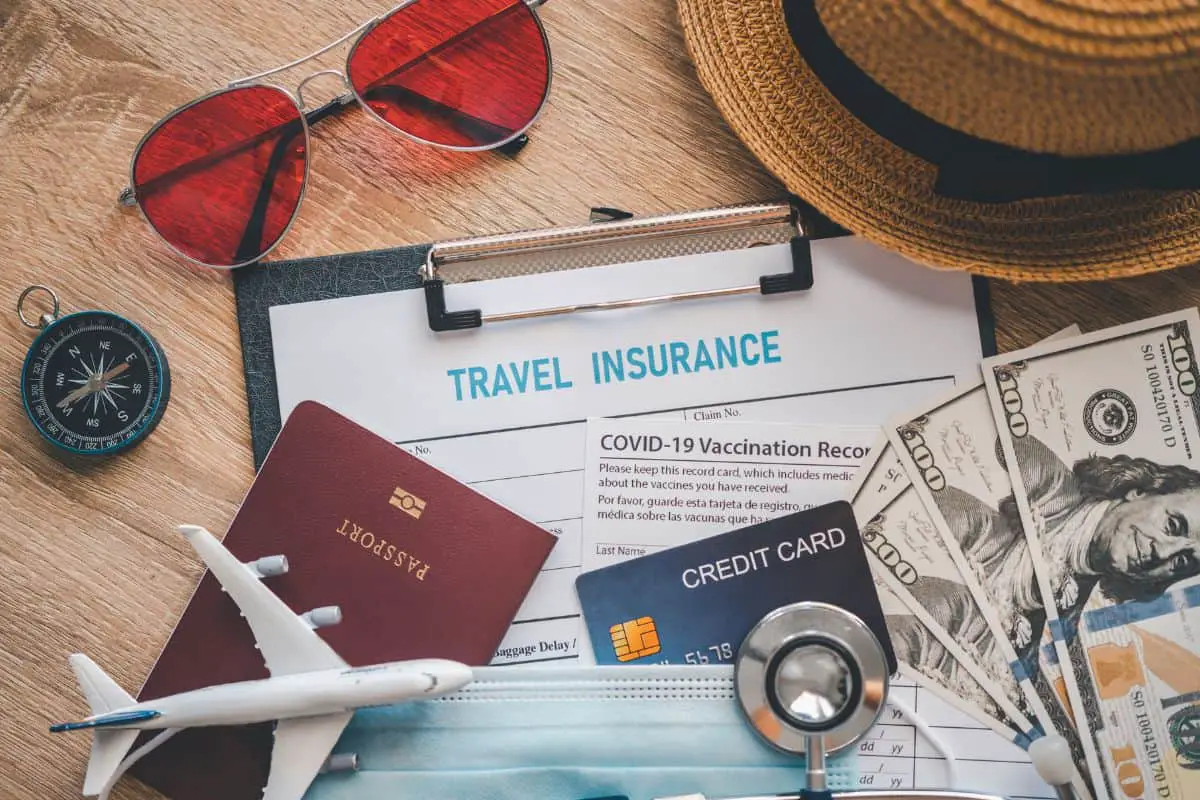
Documents and Passport Validity
Depending on your nationality and the type of visa you have, you may still need to provide other supporting documents, such as a return or onward ticket or proof of sufficient funds for your stay (and you may also need an itinerary if you are planning to venture Korea as a tourist).
Also, it's important that you check if your passport is valid at the time of entry and that it has at least one blank page for a stamp. Besides the passport, you can refer to HandyVisas to learn what requirements you need to enter South Korea.
Culture enthusiasts will love the idea that most of the tourist sites in Korea can also be visited for a small fee or free if they meet certain conditions (like wearing a hanbok in any of the five Seoul palaces ).
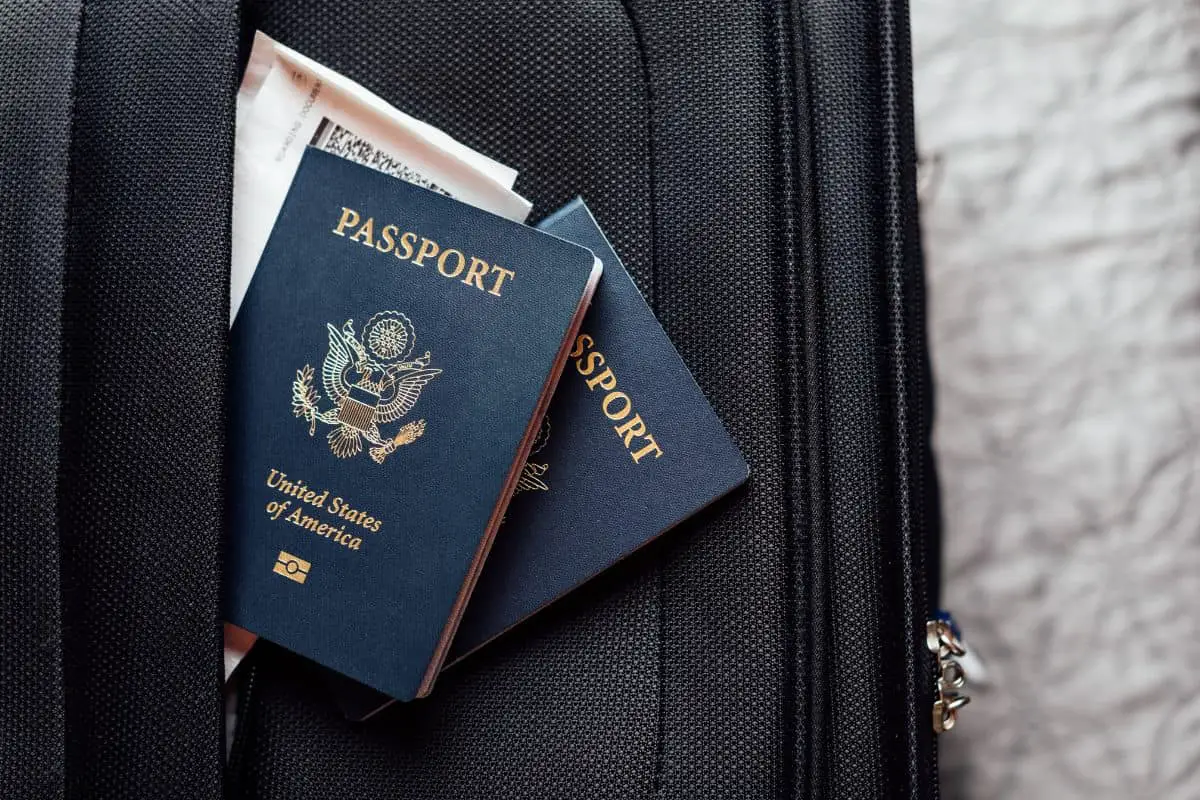
Before starting the process, you have to make sure that you have the following: a valid passport, an ID photo following the K-ETA conditions, dual nationality information (if applicable), travel agency information (optional), and an address in Korea .
There’s also a ₩10,000 fee (~$8USD) for the application process, and additional fees depending on your online payment method may apply. Be sure to check everything carefully before you hit send because once you pay this amount, you can never get it back.
You must also be willing to disclose a history of disease-related information and state past criminal records. For more information regarding this process, please visit the Application Requirements page of the K-ETA website.
Applying for a K-ETA is very simple. First, you must apply for K-ETA through the K-ETA official website or download the mobile app (in Google Play or Apple App Store ) at least 24 hours before boarding an airplane or ship bound for Korea.

Once you have chosen your mode of application, here’s a step-by-step guide to the whole process:
1. Choose your preferred language and service type on the upper left corner of the site. The website offers multiple language options.
2. Click the two bars in the upper right corner, and press “ K-ETA Apply .”
3. Answer the Terms and Conditions Agreement. Select your continent/region, and then select the country/region listed on your passport. Read the following agreements on the collection and use of personal information, and make sure you agree to everything before moving forward.
4. Fill in your passport number and submit your email address. Provide a valid and active email address, as you will receive confirmation and updates regarding your K-ETA application through this email.
5. Enter your personal and travel details. In this step, you are asked to upload a passport bio page image file. Fill in your personal and passport information, including your full name, date of birth, passport number, and passport expiry date.
6. If you are a dual citizen, kindly indicate “YES” once you see this option.
7. Upload your phone number. If you don’t have a personal phone number, make sure that it is a contactable and reachable line.
8. Indicate if you have ever visited Korea before, select your purpose of entry, and enter the address where you will be staying in Korea. Toggle between the Korean or English option depending on the address given to you.
You can search using the postal code search or the address search. Hit the find button on the search engine and choose the address generated by the search results. Then, you provide the full address in the space below to include specifics like the floor and room number.
9. Provide your contact number in Korea. If you don’t have a mobile phone number yet, you can input the number of your hotel, guesthouse, company, or acquaintance. Afterward, choose your occupation type.
10. Please declare if you are currently sick with an infectious disease and if you have faced any criminal charges in the past.
11. Upload your photo. You must upload a recent passport-sized photo of yourself with a plain white background. It should be in color, saved as an image file (preferably in .jpg format), and its size should be under 100 KB with a pixel density of less than 600x600.
Avoid wearing accessories like hats, scarves, or sunglasses in the picture, and opt for simple clothing. Remember that Korean identification rules require a full face, facing forward, eyes open, and looking directly at the camera.
12. Review and confirm your information. Before submitting your application, double-check all the information you entered to ensure everything is correct. If everything is accurate, proceed with submitting your application.
13. Pay the K-ETA fee. You will be prompted to pay the K-ETA application fee online using the provided payment options. Complete the payment process to finalize your application.

After completing these steps, you'll receive a confirmation email with your K-ETA application number. Once approved, the K-ETA will be sent to your email. Remember to print it out and carry it with you when traveling to South Korea.
Take note that your K-ETA is valid for 3 years (or 2 years if you applied before July 3, 2023) from the approval date. But, if the passport you used for the K-ETA application expires in less than 2 years, then the K-ETA approval will only be good until your passport’s expiration date.

Using Public Transportation
Public transportation in South Korea is known for being efficient, reliable, and relatively easy for foreigners to navigate, especially the Seoul Subway . When visiting for tourism or business purposes, you'll find that most transportation systems have English signage, albeit sometimes intermittently, making it simpler to find your way around.
Keep in mind that it's always a good idea to plan your routes in advance to avoid any confusion. To plan routes, download applications like Kakao Map ( Android | Apple ) or Naver Map ( Android | Apple ) to help you with your travel planning.
Medical Care and Emergency Assistance
In case you need medical care or emergency assistance during your time in South Korea, it's important to be aware of the available resources. You can dial 1339, which is the Medical Assistance Call Center, if you need help finding medical facilities or understanding the local healthcare system.
Additionally, make sure to visit your doctor at least a month prior to your trip to get any vaccines or medicines you might need.
Alcohol and Drug Regulations
It's essential to be aware of and adhere to the country's alcohol and drug regulations. South Korea has strict laws when it comes to drug possession and usage, with severe penalties for violations.
For alcohol consumption the rules aren’t as strict, considering that they only have stipulated the legal drinking age (19 years old) and the regulation of online alcohol sales.
This doesn’t mean that you should go crazy on your drinking. Keep in mind that despite the cultural drinking expectations , you must know your limits to keep yourself safe in a different country.
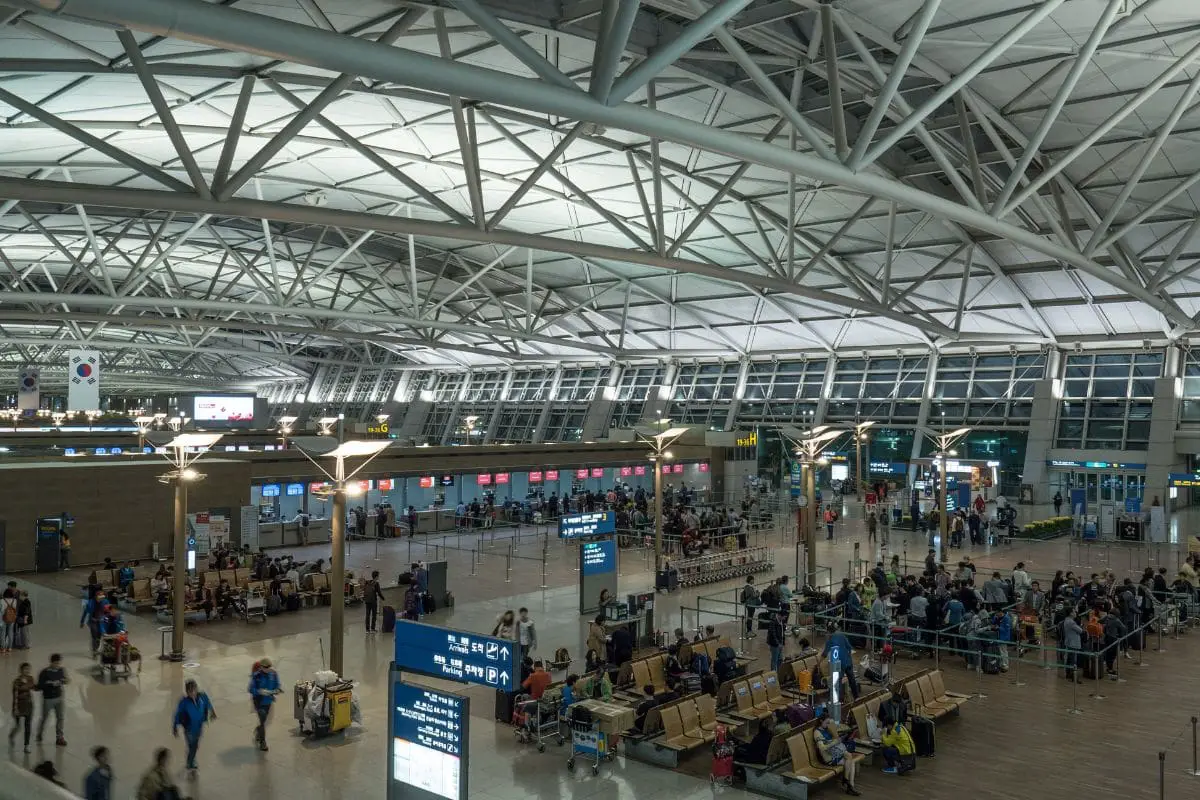
Covid-19 Advisory
Before traveling to South Korea, it's important to stay updated with the latest travel advisories. Read the Department of State's COVID-19 page and the Embassy's COVID-19 page for country-specific information.
Currently, the Republic of Korea doesn’t require incoming visitors to undergo COVID-19 testing, show proof of vaccination, or fulfill quarantine requirements for entry to Korea.
However, they still need you to present a QR code from the Quarantine Information Advance Input System . If you haven’t accomplished this, then upon arrival, airport staff will have you fill out a yellow form.
The rules and regulations are always subject to change, and you should always visit the Korea Disease and Control Prevention Agency for updates regarding this matter.
If you’re required to do a PCR test upon arrival, please refer to this list of COVID-19 Screening Clinics . Even though the restrictions on COVID-19 have been lifted, it’s still essential that you abide by the local COVID-19 guidelines and protocols to ensure your safety and the safety of those around you.
Q-Code System
When traveling to South Korea, you should be aware of the Q-Code system , which handles the management of incoming travelers. The Q-Code system is an electronic health declaration that helps Korean authorities monitor the health condition of travelers entering the country.
Upon arrival, you must download and install a mobile app on your device and register your personal information, including your vaccination status and PCR test certificate, if applicable.
The Q-Code system will assign you a unique code to track your health while you’re in Korea. You should carry your phone with you at all times during your stay in the country, as you may be required to present your Q-Code at any public health center or facility for monitoring purposes.
Last-Minute Checklist
To help prepare for your trip, create a checklist to ensure you have everything you need. Consider including the following items on your checklist:
- Valid passport with at least 6 months of validity remaining
- Travel insurance that covers your entire duration in South Korea (try WorldNomads and Visitors Coverage if you don’t have one yet)
- Copies of important documents, such as your passport and travel insurance policy
- Adequate local currency for your trip
In addition to these essentials, preparing for your health and safety while visiting South Korea is important. If you need assistance locating a facility that provides specific vaccines or medicines, visit the CDC's Find a Clinic page .
Furthermore, Americans may enroll in the Smart Traveler Enrollment Program (STEP ) to receive alerts and help the embassy locate you in case of an emergency. Lastly, familiarize yourself with local customs, etiquette , laws, and norms to ensure a smooth and enjoyable trip.
Currently, pre-departure negative PCR test certificates are no longer required to enter South Korea since September 3, 2022. However, upon arrival, travelers exhibiting symptoms like fever or cough need to undergo COVID-19 testing at their own expense.
There are no specific COVID-19 vaccination requirements for travel to South Korea. But, vaccinated visitors do benefit from not having to quarantine upon arrival. Remember that the situation can change in the future, so it is essential to stay updated on any new regulations regarding vaccination and entry.
US citizens traveling to South Korea for short-term business or tourism purposes don’t need a tourist visa from April 1, 2023, to December 31, 2024. The Korean Electronic Travel Authorization (K-ETA) is also not required during this period. However, your passport must be valid at the time of entry, and you need at least one blank page for entry stamps.
Foreign nationals entering South Korea won’t be required to undergo a 7-day mandatory quarantine. However, travelers must still obtain a valid visa or K-ETA before their trip. Moreover, I advise you register your travel and health information through the Quarantine COVID-19 Defense (Q-Code) system before traveling to streamline the airport arrival process.
More South Korea Travel
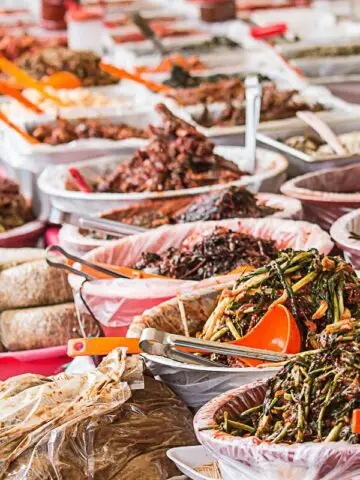
Sharing is caring!
Reader Interactions
No Comments
Leave a Reply Cancel reply
Your email address will not be published. Required fields are marked *
This site uses Akismet to reduce spam. Learn how your comment data is processed .

- Visa Application Helpline
Subscribe to our newsletter
Learn how to live a sustainable long-term travel lifestyle.
By signing up, you agree to the our terms and our Privacy Policy agreement.
Top 27 Places to visit in Darjeeling, Explore the Beautiful Hills of Darjeeling
Top 10 things to do when traveling to shimla: shimla travel guide, the ultimate paris travel guidelines for first timers | top attractions & things to do.

Step-by-Step Guide to Obtaining a South Korea Tourist Visa
South Korea is a thrilling destination where the vibrant energy of modern cities like Seoul harmoniously coexists with the serene allure of ancient temples and captivating countryside scenery. Whether you are a foodie or a history enthusiast, South Korea has something for everyone.
While South Korea is undoubtedly worth the visit, many travelers must first navigate the South Korea visa application process . For some nationalities, this process can be quite challenging. It’s similar to watching South Korean TV series where biases and different judgments can sometimes be observed.
The good news is that citizens of several countries including Malaysian enjoy visa exemptions for short-term visits. However, if you’re not among the exempt, you’ll need to secure a South Korea tourist visa to experience the wonders of this nation fully.
In this step-by-step guide to filling out the South Korea visa application, I’ll walk you through the entire process of applying for a South Korean Tourist Visa. From understanding the types of visas available to collecting your visa and preparing for your journey, by the end of this article, you’ll have all the information you need to embark on your South Korean adventure with confidence!
WHAT IS COVERED IN THIS ARTICLE?
Understanding the South Korea Tourist Visa

When it comes to understanding the South Korean tourist Visa, here’s what you need to know:
Short-Term Tourist Visa (C-3) A.K.A. South Korea Tourist Visa
If you’re planning to explore South Korea’s beauty and culture for a short stay, the Short-Term Tourist Visa, known as C-3, is your go-to-choice. With this visa, you can enjoy up to 90 days in South Korea, perfect for tourists, transit passengers, individuals seeking medical treatment, or those attending cultural events.
However, keep in mind that this visa doesn’t allow you to engage in any paid work during your stay.
Step-by-Step Application Process for a South Korea Visa Application
Now that you’ve got a grasp of the basics regarding the South Korean Tourist visa, let’s dive into the core of this guide: a step-by-step walkthrough for your South Korea visa application.
Step 1: Determine Whether You Need to Apply for a South Korea Visa or Not
The first step is to determine whether you fall into the category of travelers who need a South Korea Tourist Visa or if you are among those fortunate enough to be exempted from this requirement. You can check this on South Korea’s official Visa Portal.
Visa Exemption for Certain Nationalities
If you’re from specific countries like the European Union nations (except Cyprus), Australia, Canada, or the United States, South Korea offers you the privilege of visa exemption, allowing you to enter the country without a visa for varying durations.
However, such travelers from these visa-exempt nations must complete an online application for an electronic visitor visa waiver for South Korea, known as K-ETA . which offers the convenience of a fully digital process. Before you do anything else, make sure to verify your eligibility for the K-ETA.
Visa Requirements for Certain Nationalities

If you do not qualify for visa-free entry, you will need to apply for a South Korean Tourist Visa through the Korean Embassy. The key factors to consider for this include your nationality and the purpose of your visit. Remember, South Korea doesn’t issue sticker visas to be affixed to your passport. Also, having a travel history, especially in OECD countries, can significantly increase your chances of getting approved for a Korean visa.
Step 2: Prepare for South Korea Visa Requirements
After confirming that you do require a South Korean Tourist Visa, the next crucial step is to diligently prepare all the necessary documents, including your passport and any specific requirements for the South Korean Tourist Visa well in advance.
This foresight ensures that you won’t find yourself in a last-minute scramble when these essential documents are requested during the submission process.
South Korea Tourist Visa Requirements
Here is a short list of the essential documents and criteria you need to meet to successfully apply for a South Korea Tourist Visa:
- Passport and Passport Photos
- Ensure your passport is valid for at least another six months from your planned date of entry into South Korea.
- Your passport should have a minimum of two blank pages for visa stamping.
- Provide passport-size photos (3.5 cm x 4.5 cm) that meet specific criteria: white background, recent (taken within the last three months), neutral facial expression, fully visible face and ears, and no glasses.
- Visa Application Form
- Obtain the South Korea Visa Application Form, either online e-from from the Embassy or Consulate website, in person at the Embassy/Consulate, or from a visa application agency if you’re using their services.
- Complete the form accurately with a black or dark blue pen, ensuring clarity and legibility. The details on how to fill this form are discussed in the next step, so read on!
- Proof of Travel Itinerary
- Include a copy of your return or onward flight ticket, indicating your planned entry and exit dates from South Korea. No need to purchase an actual ticket or simply create an itinerary with day-to-day activities, places to visit.
- Prepare a Proof of Accommodation (a hotel booking)
- Provide evidence of your accommodation in South Korea, such as a hotel reservation or a letter of invitation from a host if you’ll be staying with family or friends.
- Financial Statements
- Demonstrate your financial capability to cover the duration of your stay by submitting bank statements and income tax returns. Bank statements should be at least for latest 6 months.
- Prepare your employment and income documents.
- Depending on your circumstances, you may need to submit additional documents such as reference letters, letters of acceptance from educational institutions, letters from employers, or employment contracts.
- Any used OECD countries visas such as Japan, Schengen or American visa.
- Meeting Health and Security Requirements
Ensure that you meet any health and security requirements outlined by the South Korean authorities or the specific Embassy/Consulate handling your application. This may include medical examinations or security clearances, if applicable.
- Understanding Visa Fees and Payment Methods
Familiarize yourself with the South Korea visa fees and the accepted payment methods specified by the Embassy or Consulate where you are applying. Be prepared to pay the required fee in cash during the application process.
Remember, the specific South Korea visa requirements can vary depending on your nationality and the type of visa you’re applying for. It’s essential to always check with the relevant Embassy or Consulate for the most up-to-date and accurate information before you start your application process!
Step 3: Filling Out the Visa Application

For this step, you need to first download the South Korean Visa application form from Korea Visa Portal . You can download and print it to fill out by hand, but I strongly recommend using the electronic version for easy editing and simplicity. If you choose the printed form, make sure your handwriting is neat.
Now that you are ready to fill out this form, here is a section-by-section guide on what you should complete:
Section 1: Personal Information
As you begin filling out your South Korea visa application, the first step is to provide important personal information. Here’s a complete guide to assist you with this:
- Full Name: Provide your complete name in English characters, exactly as it appears in your passport. If you have a middle name, you can omit it, as Korean names typically lack one.
- Chinese Name: If applicable, enter your name in Chinese characters corresponding to your English name.
- Gender : Specify your gender.
- Birthdate : Format your birthdate as Year, Month, and Day in numerical digits.
- Nationality : Indicate your nationality.
- Country of Birth : Mention the country in which you were born.
- National Identity No. : In some countries, citizens are required to have a national identity number, such as Aadhar in India or the National Registration Identity Card Number (NRIC) in Malaysia. If your country does not have this requirement, simply write ‘N/A.
- Other Names: If you have used different names during previous South Korea visa applications or visits, record them here. Otherwise, select “No” and write “N/A.”
- Dual Citizenship: If you hold dual citizenship, answer “yes” and list the countries you are a citizen of. If not, select “No” and write “N/A.”
Section 2: Details of Visa Application
The second part is about the details of your visa application, matching them with your reason for visiting:
- Period of Stay: Choose between long-term and short-term, depending on your intended duration of stay.
- Status of Stay: Select the category that best corresponds to your visit purpose. Common categories include Short-Term options like Tourist or Business and Long-Term categories like Resident or Marriage to a Korean Citizen.
Section 3: Passport Information
Moving to the second page of the form, you need to provide details about your passport information:
- Passport Type: Check the relevant category, often “Regular” for most applicants.
- Passport Number: Enter your passport number as found on the bio page.
- Issuing Country: Specify the country where your passport was issued.
- Where the Passport is Issued: Provide the place of issuance.
- Issuance Date: Use the format as indicated in your passport.
- Expiry Date: Record the passport’s expiration date.
- Additional Passport: If you possess another passport, furnish the requested information.
Section 4: Contact Information
Next, share your contact details:
- Home Country Address: Enter your permanent address in your home country.
- Alternate Address: If you currently reside at an address different from your permanent one, include it here. Use “N/A” if both addresses are the same.
- Cell Phone Number: Provide an active mobile phone number.
- Telephone Number: Include a landline number if available.
- Email Address: Enter your email address.
- Emergency Contact Information: Provide information about an emergency contact.
Section 5: Marital Status and Family information
Your marital status is the focus here:
- Single or Divorced: Indicate the appropriate category, and use “N/A” if not applicable.
- Civil Status: Share details about your marital status.
- Information About Your Partner: Provide information about your spouse or partner if applicable.
- Children: If you have children accompanying you on the trip, answer accordingly.
Section 6: Education
The educational section inquires about your highest degree and educational history:
- Highest Degree: Select the highest degree you hold, such as a Bachelor’s Degree or an alternative option like Elementary Graduate.
- Name of School: Mention the name of the school where you last graduated or attended.
- School Address: Include the school’s address, following the format of city, province, and country.
Section 7: Employment
Here, you’ll specify your employment status:
- Category Selection: Choose the employment category that best fits your situation. Options include government employees, entrepreneurs, self-employed, and more.
- Details of Employment: Ensure the information aligns with the documents you plan to submit, such as a Certificate of Employment or Business Permit.
Section 8: Details of Visit
This segment is pivotal to your application:
- Purpose of Visit: Select the appropriate purpose, whether it’s tourism or visiting family/relatives/friends. Be cautious with your choice, as selecting the wrong purpose can lead to visa denials, particularly for tourist visas.
- Duration of Stay: Specify the number of days you plan to stay in Korea. Ensure your budget aligns with this duration.
- Planned Entry Date: Provide the intended date of your entry into Korea.
- Accommodation: Indicate where you plan to stay in Korea.
- Korea Contact Number: Provide a contact number in Korea. If staying in a hotel, you can use the hotel’s number.
- Travel History: Detail your previous travels to South Korea within the last 5 years.
- Travel History to Other Countries: Specify your travel history to other countries during the preceding 5 years. You can reference your passport for this information.
- Family Members in Korea: If you have family members, such as a spouse, parents, siblings, or children, currently residing in South Korea, include their details.
- Accompanying Family Members: If any of these family members are travelling with you to South Korea, provide their information. Note that this section does not apply to friends; it should mirror the details of your visit as stated in the application.
Section 9: Details of Invitation
If you are invited to Korea by a friend, relative, family, or company, you must provide their information in this section.
Section 10: Funding Details
Share funding-related information:
- Estimated Travel Costs: Calculate your estimated travel costs, typically computed as days of stay multiplied by USD 100.
- Expense Payer: Indicate who will cover your expenses. If self-funded, write “Myself.” For expenses covered by another person, provide their details. Ensure you include a guarantee letter and the financial documents of the sponsor, especially if you are unemployed or lack sufficient funds.
Section 11: Assistance with the Form
Leave this section blank, as the travel agent who assesses your documents and submits your application will complete it. We also provide assistance throughout the entire process of obtaining a South Korea Tourist Visa. If interested, please contact us now!
Section 12: Declaration
Read the notice carefully before signing the declaration. Ensure all your answers are double-checked for accuracy. Armed with these detailed instructions, you now possess the knowledge required to competently complete your South Korea Visa Application Form!
Tips for Applying for a South Korean Tourist Visa
- When you’re completing the form, use big letters or turn on CAPS LOCK to make it easier to read and fill out.
- For checkboxes, you can either prepare a check symbol or copy it directly from the form.
- In cases where you encounter questions with no applicable answers, simply write ‘N/A,’ signifying “Not Applicable.”
Step 4: Making Payment for Your South Korea Visa on the Visa Portal (e-visa or K-ETA only)
Once you’ve completed your visa application on the South Korea visa portal, the next step is to make your payment. South Korea’s visa application process typically requires an e-payment for the visa fee. Make sure that you fill out the correct payment details and double-check before proceeding. Once you’ve verified everything, confirm the payment.
The next step now is to submit your visa application!
Step 5: Submitting Application at an Embassy/Consulate
When you’re ready to submit your South Korea visa application, here’s how you can navigate the process seamlessly:
Making An Appointment

If you’re planning to visit a South Korean diplomatic mission in anywhere, making an online reservation is now mandatory. Here’s a step-by-step guide on how to do it:
- Go to the website https://consul.mofa.go.kr/en/main.do
- Choose English as the language if it’s not already selected.
- Click on the “Reservation” tab to start the booking process.
- Proceed with the Non-Membership Log In option.
- Provide your name, phone number, and email address as required.
- Follow the prompts to complete your reservation.
- Remember, having an appointment is compulsory for visiting any South Korean diplomatic mission, so be sure to make your reservation in advance.
- Submit the South Korea visa application: Once you’ve identified the correct Embassy or Consulate and have appointment confirmation it is time to submit your visa application following their guidelines. Ensure you have all the necessary documents and information ready for submission.
Now, you have to wait for some time for the visa application to be processed.
Applying with a Sponsor in South Korea
If you have a sponsor or host in South Korea, they can apply for a “Confirmation of Visa Issuance” on your behalf through the South Korea Visa Portal of the Korea Immigration Office. The steps include:
- Online Application: Your sponsor must complete the online South Korea Visa application form.
- Payment: Pay the required fee for the application.
- Document Submission: Attach the necessary documents for the South Korea visa, depending on the purpose of your visit.
- Confirmation of Visa Issuance: Await confirmation of South Korea Visa Issuance. If the application is approved.
- Confirmation Dispatch: Print the Confirmation for your records.
Please Note: Visa processing times vary based on the specific Embassy or Consulate where you apply. It’s advisable to submit your completed application at least 15 days before your intended travel date but no earlier than three months.
Step 5: Wait for a Decision
While you’re waiting to hear back about your South Korea visa application, here are answers to some common questions you might have:
How long does it take for a South Korean visa to be approved?
The processing time for a South Korean visa can differ based on the Embassy or Consulate where you applied. On average, it takes around 7 to 15 days. To make sure everything goes smoothly, it’s advisable to submit a complete application at least 15 days before your planned travel date. However, avoid applying more than three months ahead of your travel plans.
What to Expect During the Decision Period?
While your application is under review, you can expect the following:
- Processing Period: The processing period may take several weeks, so be patient during this time.
- Communication : The Embassy or Consulate may contact you if additional documentation or information is required. Be responsive and provide any requested details promptly.
- Status Updates: You can check the status of your application through the tracking system provided by the Embassy or Consulate. This will keep you informed about the progress of your application.
Step 6: Receiving Your South Korea Tourist Visa

Your visa application has only two outcomes:
Visa Approval: If your South Korea visa application is approved, you will not receive any notification regarding the outcome. There will be no visa affixed to your passport. Instead, you will have to visit the website visa.gov.kr to check your visa status and print it from there.

Visa Denial: If your application is denied, you will not any notification either also you will have to wait at least 3 months to reapply again.
Visa Validity and Duration
Understanding the validity and duration of your South Korea visa is crucial for planning your trip. Here’s what to keep in mind:
- Single or Multiple Entry: Depending on your visa category, you may have a single-entry visa, which allows you to enter South Korea once, or a multiple-entry visa, which permits multiple entries within the visa’s validity period.
- Duration of Stay: The duration of stay allowed in South Korea will be specified on your visa. Ensure that you adhere to this period to avoid any visa violations.
Top 5 Reasons for Your South Korea Visa Denial

If your South Korean tourist visa has been denied, you might be wondering why your visa application was rejected. Here are some common reasons:
- You may not meet the requirements for the type of visa you applied for.
- Your application may have incorrect or missing information.
- The documents you submitted might not meet the visa requirements.
- There could be safety or security concerns about your visa application.
- Health concerns if you’re carrying an infectious disease.
To avoid having your tourist visa denied, be careful when filling out the application form. Make sure all the information matches your passport exactly.
Remember, even if your visa is approved, it doesn’t guarantee entry into South Korea. The final decision is made by border officials.
Extending Your Stay or Changing Your South Korean Visa Status
Should you wish to stay in South Korea beyond the expiration date of your visa, you have the option to apply for a visa extension at the Immigration Office in South Korea.
To do this, ensure you apply for the South Korea visa extension at least four months before your current visa’s expiration. You will need to submit the following documents for a visa extension:
- Your passport
- The completed application form for permission of extension of stay (available for download online)
- Payment of the processing fee
- Your Foreign Registration Card (if you are extending a long-term visa)
- Any additional documents are required based on the specific visa category and your circumstances.
By following these guidelines, you can navigate the waiting period and the potential outcomes of your South Korea visa application with clarity and preparation.
South Korea is an incredible destination waiting for you to explore, with its unique blend of tradition, modernity, stunning landscapes, and warm hospitality. As you embark on your South Korean adventure, you might initially find the visa application process daunting, but don’t worry; it’s simpler than it seems.
All you need to do is ensure that your information and documents are accurate and verified. Keep a close eye on your emails from the Embassy and notifications to ensure a smooth application process and increase your chances of visa approval.
We hope this guide has provided you with valuable insights for your South Korean journey. If you found this article helpful, be sure to check out our other visa guides.
We’re eager to hear from you, so please share your thoughts in the comments. We wish you a fantastic and unforgettable experience in South Korea, and we look forward to being part of your travel adventures!
Related Posts
20 unforgettable day trips from seoul that you absolutely must experience | exploring the korean lifestyle, ultimate guide to new zealand tourist visa application: a step-by-step guide, us tourist visa how to apply: the us visitor visa guide, the best way to obtaining a canada tourist visa | travel to canada the land of maple leaf.
Save my name, email, and website in this browser for the next time I comment.
This site uses Akismet to reduce spam. Learn how your comment data is processed .
Type above and press Enter to search. Press Esc to cancel.
South Korea Tourist visa
Required documents for south korean visa, for e-visa through the visa portal.
- Valid for at least 6 months and with at least 2 blank pages for stamps
- Size 3.5cm x 4.5cm, front view, and taken within the last 6 months
- Completed visa application e-form through the Visa portal
- Other documents for the status of stay
For sticker visa applications
- Scanned copies of the passport data page
- Completed and signed visa application form No.17
- Size should be 3.5cm x 4.5cm
- Original and stamped bank statements for the past 3 months.
Note: Contact the Korean consulate or embassy in your country to check for any additional requirements. Required documents may vary depending on the country of residence or jurisdiction.
South Korea Visa Application Steps
For e-visa applications via the portal.
- Gather the required documents
- Visit the official Korea Visa portal to fill out the form.
- Attach your digital passport photo and submit the South Korea visa application form online.
- The fee can be paid online using debit or credit cards.
- For e-visa, the sponsor needs to initiate the application process by going to the Korean Visa Portal, filling out the Korea visa application form for the applicant, and submitting it for review. After which, the sponsor must send the confirmation number to the applicant and the applicant must download the form and submit it to the respective Korean diplomatic mission along with the other requirements and pay the visa fee for the visa to be issued.
- Visit the official South Korean Visa website , select your nationality, and choose a short-term visit for the tourism purpose, select the length of stay and click Start.
- Fill out the South Korean visa application form. The form must be filled out in block letters in either English or Korean.
- Check with the Korean diplomatic mission in your country if they allow applicants to download the form from the website and fill it out by hand.
- Contact the South Korean consulate, embassy, or VAC to enquire if you need to schedule an appointment or if it is possible to submit your South Korean visa application without an appointment, as long as you do so within the normal operating hours.
- Submit the printed application form to the South Korean consulate, embassy, or VAC along with the other South Korea visa requirements, supporting documents and photo.
- Pay the South Korean visa application fee.
- For sticker visa applications, the inviter or sponsor needs to fill out the South Korea visa application form for the applicant and submit it for review to the Korean Immigration Office. After which, the sponsor must send the confirmation number to the applicant so the applicant can submit it to the Korean diplomatic office in his country of citizenship or residence so that a visa can be issued.
South Korea Visa Fees
The processing fees for South Korean visa applications are US $40 for a single-entry visa with a stay of fewer than 90 days and US $60 for a single-entry visa with a stay of 91 days or more. However, visa fees may differ because of the principle of reciprocity, the applicant’s nationality, international practices, and international agreements. Additional fees may also be charged when the visa is paid online through the portal.
Where to Apply
There are two ways to submit South Korean visa applications. Applicants can submit their South Korean visa applications online through the official South Korean e-visa portal . Alternatively, for sticker visas, applications can be submitted through South Korean consulates, embassies, or visa application centers. You can check the list of South Korean visa application centers here . Applications can only be submitted in countries where the applicant is a citizen or a resident.
For e-visa applications submitted by a sponsor on behalf of the applicant, applications can be initiated by the inviter or sponsor on the visa portal. For sticker visa applications, the inviter or the sponsor needs to initiate the application process and submit the South Korea visa application form to the Korean Immigration Office.
South Korea Visa Application Processing Time
The processing time for a South Korean e-visa is within 3 working days after submission. However, there are some cases when the processing time takes longer, e.g. when additional documents are required. If processing takes longer than usual, a notice will be sent to the applicant via e-mail or SMS.
South Korean visa applications submitted to the South Korean diplomatic missions are processed within working 5 days of submission. However, in some cases it might take longer. Applicants are advised to refer to the notice boards of the Diplomatic mission where submission was made for the duration of the process as each office might have different processing times, depending on their workloads.
For approved visa applications
It is advised to check the details on the visa and make sure they match the information on the passport.

Check if you need a visa for your next destination
Latest news and articles.

Do you need a passport to book an international flight?

Best Summer Destinations 2024

Greece unveils visa-on-arrival program for Turkish tourists to 10 islands
- Partner with us
Tourist visa
- Requirements
- Business visa
- Family visa
- What to see
Tourist visa to South Korea
A tourist visa to South Korea is granted for the purpose of tourism and leisure or visiting relatives in South Korea and is valid for 90 days from the date of issuance (single and double entry; make sure your visa covers your travel dates ) or 1-5 years for multiple entry. Nationals from countries eligible for Electronic Travel Authorisation may apply for K-ETA instead.
Travellers who are seeking entry into South Korea must submit their visa application through a travel agent appointed by the Embassy. Global Singapore has been appointed by the South Korean Embassy to submit visa applications on the applicant’s behalf.
Please note, we work on a pre-booked appointment basis only to ensure efficient and professional assistance to each of our clients. Please, scroll down to book an appointment.
- Required documents
- Processing time
Required documents for a tourist visa to South Korea
- Arrange your documents in the order according to the checklist.
- All documents should be printed or photocopied on A4-sized paper.
- Separate all the application documents for different applicants into individual sets.
- NO staples/pins/paper clips should be used on documents.
- Visa application form . Completed and signed visa application form . It must be signed by hand (wet signature in blue ink).
- Photograph . 1 recent passport-size colour photograph on a white background – can be arranged in our office . You cannot wear a white top; the top must have sleeves. The photo must be glued to the application form.
- Passport . Original and copy with at least 6 months validity beyond the validity of the visa.
- A copy of NRIC/EP/Spass/WP/LTVP/DP . For work passes issued with QR code, you are required to use the “SGWORKPASS” app to obtain your pass information. A clear printout of the scan result obtained within recent 1 week must be submitted. The printout must show the access date at the top and the bottom. Re-entry permit (applicable to PR only).
- To be eligible to apply for a multiple-entry visa, you must have visited South Korea at least once in the last 5 years.
- Company letter . Letter issued by Singapore company to verify your employment status such as designation, salary, date of hire, date and purpose of visit (original and issued within recent 1 month ). LOC (Letter of Consent) issued by MOM is required if you are LTVP / LTVP+ holder.
- If you are self-employed: latest printout of ACRA business profile (issued within the last month).
- If you are a student: School letter stating name, passport no., and student status (original and issued within recent 1 month).
- spouse’s company letter, spouse’s passport (copy), and marriage certificate in English (copy).
- child’s company letter, child’s passport (copy), and child’s birth certificate in English (copy).
- parent’s company letter, parent’s passport (copy), and child’s birth certificate in English (copy).
- child’s school letter, child’s passport (copy), and child’s birth certificate in English (copy).
- sibling’s company letter, sibling’s passport (copy), and both applicant and sibling’s birth certificate in English (copy).
- Bank statements . Recent 3 months Singapore bank account statements/passbook (original and copy) / e-statements, that show all transactions for the month. *Credit/debit card / overseas statements will not be accepted. All pages of the statement must be included. Not required if the Korean university is an IEQAS university .
- Global Singapore visa order form . Completed and signed Global Singapore visa order form .
- Document checklist .
Fees for a tourist visa to South Korea
Select your nationality in the following list. If your nationality is not on the list select the OTHER NATIONALITIES option.
Nationality: —Please choose an option— Australia Austria Azerbaijan Barbados Colombia Dominican Republic Ghana Iran Israel Italy Japan Kyrgyzstan Mongolia Peru Philippines Russia Senegal Spain Sweden Taiwan Tajikistan UK Ukraine USA Uzbekistan Vietnam OTHER NATIONALITIES
Multiplicity: —Please choose an option— single, under 90 days single, over 90 days double, 6 months multiple, 1-5 years
Consulate fee:
Service fee:
All fees and charges are subject to prevailing GST.
Processing time for a tourist visa to South Korea
- Visa processing time for all types of visas is 5 working days excluding the submission day.
- Urgent service is not available.
Delivery of your passport
- Should you require to print any of the required documents in our office, please note that an additional charge will be applied.
- EXPLORE Random Article
How to Apply for a Korean Tourist Visa
Last Updated: February 22, 2022 References
This article was co-authored by Jennifer Mueller, JD . Jennifer Mueller is an in-house legal expert at wikiHow. Jennifer reviews, fact-checks, and evaluates wikiHow's legal content to ensure thoroughness and accuracy. She received her JD from Indiana University Maurer School of Law in 2006. There are 7 references cited in this article, which can be found at the bottom of the page. This article has been viewed 7,878 times.
If you want to travel to the Republic of Korea (South Korea) for a short visit as a tourist, you typically don't need a visa. However, if your trip is going to take more than 90 days (30 days for nationals of some countries), you'll need a tourist visa. You can apply for a tourist visa either online or at the Korean embassy or consulate closest to you. Immigration officers will give you your visa when you go through customs at the port of entry. [1] X Research source
Completing a Visa Application

- If you plan to stay in Korea for longer, you still need a visa, even if you are going to Korea to participate in tourist activities.
- For a list of countries that have been granted visa-free travel to Korea, visit https://english.visitkorea.or.kr/enu/TRV/TV_ENG_2_1.jsp .

- For example, if you are a Chinese national and are traveling to Korea with a tour group, you would need a C-3-2 group tourist visa.
- Use Korea's Visa Navigator, available online at https://www.visa.go.kr/openPage.do?MENU_ID=10101 , to determine which visa category is right for you.

- If you're planning to submit your application online, make sure you have a digital copy of your passport photo that you can upload.

- The application requires you to provide information about yourself, your citizenship, and your reasons for wanting to visit Korea. Answer every question completely and honestly.
- You can also fill out a paper application at the Korean embassy or consulate nearest you. To find contact information, go to http://www.mofa.go.kr/eng/index.do and select the name of your country from the drop-down menu at the top of the page.
Tip: A past criminal conviction or other negative information won't necessarily cause Korean immigration officials to deny your tourist application. However, your application will be denied if they discover that you lied on your application or left out any relevant information.

- For example, if you are a Chinese national traveling with a tour group on a group tourist visa, you'll need a confirmation page showing that you're booked for the tour, along with information about the tour company and where you'll be staying while you're in Korea.
- You'll likely need to show that you have a return flight out of the country before your visa expires along with information about your accommodations in Korea. If you're staying with friends or family while in Korea, you'll likely need a letter from them.
Submitting Your Application

- If you submit your application electronically, you must also pay your application fee electronically. The amount of your application fee varies depending on your country of origin. The visa portal accepts major credit and debit cards for payment.
Warning: You don't necessarily have to pay your application fee at the same time that you submit your completed application. However, your application won't be processed until after the fee is paid.

- Go to http://www.mofa.go.kr/eng/index.do and select the name of the country where you live from the drop-down menu at the top of the page. You'll see contact information for all of the Korean embassies and consulates in your country. Simply pick the one that's closest to you.
- If you're submitting your application in person, you can still fill out the application online if you want. Print the completed application and take it with you to the Korean embassy or consulate.
Warning: If you submit your application in person, you must pay your application fee immediately. Call ahead to find out what methods of payment are accepted. Many Korean embassies and consulates don't take credit or debit cards.

- For example, if you are visiting Korea as a medical tourist to have a medical procedure done as well as engage in tourist activities, you typically need confirmation from the doctor or from the hospital where the procedure will take place.
- Most tourist visas don't require a sponsor. However, if you're concerned that your application might be denied, a sponsor might help improve your chances.

- Electronic visas will be programmed into your passport. You'll get the print visa when you go through customs at the port of entry.
- If you need a paper visa in your passport before you depart for Korea, you'll have to turn over your passport to the nearest embassy or consulate. When your visa is ready, they'll mail your passport back to you with the visa inside.
- If your application is denied, you typically won't be told why. However, you're welcome to reapply immediately. No part of your application fee will be refunded if your application is denied and you'll have to pay the fee in full again if you decide to apply again.
Traveling to Korea

- If you applied for your visa in person at a Korean embassy or consulate, you'll get a confirmation letter in the mail. Take that confirmation letter with you when you travel to Korea.

- If you bring something with you that is not allowed in Korea, it will be confiscated and you may not get it back. To avoid this, check the list of items that aren't allowed before you start packing for your trip.

- Read the instructions carefully and make sure you enter your information neatly and legibly.

- The customs officer will look over your paperwork and confirm your identity. They may also ask you questions about your trip or your plans in Korea.
- If the customs officer approves you to enter the country, they will place your visa in your passport. Pay close attention to the date your visa expires and make sure you've left the country before that date. While you can try to extend an expired tourist visa, it is a difficult process with no guarantees.
Warning: Having a visa does not guarantee that you will be allowed to enter Korea. Korean immigration officers have broad authority to determine who will be allowed into the country.

- There are also two Medical TICs at the Busan and Incheon International Airports. At these TICs, you can learn about medical tourism and get a free customized consultation if you think medical tourism might benefit you.
Expert Q&A
- This article covers how to get a tourist visa for the Republic of Korea (South Korea). Tourists are typically advised not to travel to the Democratic People's Republic of Korea (North Korea) due to the high security risk. [14] X Research source Thanks Helpful 0 Not Helpful 0
You Might Also Like

- ↑ https://english.visitkorea.or.kr/enu/TRV/TV_ENG_2_1.jsp
- ↑ https://www.visa.go.kr/openPage.do?MENU_ID=10102
- ↑ https://www.visa.go.kr/openPage.do?MENU_ID=10105
- ↑ https://www.airport.kr/ap_cnt/en/arr/process/immpro.do
- ↑ https://www.airport.kr/ap_lp/en/arr/process/immexa/immexa.do
- ↑ https://english.visitkorea.or.kr/enu/TRV/TV_ENG_3_2_1.jsp
- ↑ https://www.smartraveller.gov.au/destinations/asia/north-korea-democratic-peoples-republic-korea
About this article

Did this article help you?

- About wikiHow
- Terms of Use
- Privacy Policy
- Do Not Sell or Share My Info
- Not Selling Info

Understanding South Korea Visa Costs
South Korea, a country blending ancient traditions with cutting-edge technology, draws visitors from all corners of the globe. Whether it’s for tourism, business, study, or work, understanding the costs associated with obtaining a South Korean visa is crucial for planning your journey. This comprehensive guide delves into the various types of visas, their respective costs, and additional expenses you might encounter.
The Different Types of South Korean Visas and Their Costs
South Korea offers a range of visas, each tailored to different travel purposes. Here’s an overview of the main types and their standard costs:
Tourist Visa (C-3) : Ideal for travellers exploring South Korea or visiting relatives. Fees vary based on nationality and agreement between countries but generally range from $40 to $90.
Business Visa (C-2/C-4 ): For those engaging in business-related activities. The cost is similar to the tourist visa.
Student Visa (D-2/D-4) : Necessary for international students. Fees can range from $50 to $100.
Work Visa (E-series) : This category has several subtypes, including teaching (E-2) and professional employment (E-1, E-3, etc.). Costs can vary, typically between $60 and $120.
Family Reunion Visa (F-series ): For joining family members in South Korea. The cost is around $50 to $100.
Factors Influencing Visa Costs
- Nationality: Visa fees can differ based on reciprocal agreements between South Korea and the applicant’s home country.
- Visa Type: Different visas have different fees, reflecting the processing work involved.
- Duration of Stay: Longer stays may incur higher fees.
- Multiple Entry Visas: These generally cost more than single-entry visas.
Additional Costs to Consider
- Service Fees: If you use a visa application service or agency, they will charge an additional fee for their services.
- Travel Insurance: Some visa types may require proof of travel insurance.
- Health Checkup: Certain visas, like work visas, might require a health checkup, which could add to your expenses.
Courier Fees: If you need to send documents via courier or wish to have your passport couriered back to you.
Budgeting for Your Visa Application
Application fee.
The application fee is the primary cost of your visa process. This mandatory fee is paid directly to the South Korean Embassy or Consulate handling your application. The amount varies depending on the visa type, your nationality, and the country where you apply. It’s crucial to check the latest fee structure on the official website of the South Korean Embassy or Consulate in your region.
Supporting Documents
Various supporting documents are required for a South Korean visa application, each potentially incurring costs. These may include:
- Police Clearance Certificate: A document proving you have no criminal record. The cost varies by country and sometimes by region within a country.
- Medical Examinations: Certain visa types, such as work or student visas, might require a comprehensive medical check-up, including tests for infectious diseases. Costs depend on the medical facilities and the tests required.
- Document Authentication: Some documents might need official authentication or apostille, which could involve additional fees.
- Translations: If your documents are not in English or Korean, professional translation services might be necessary, incurring further costs.
Travel Costs
If you don’t live close to a South Korean Embassy or Consulate, you’ll need to budget for travel expenses. This includes:
Transportation: Costs for public transport, fuel (if driving), or airfare (if necessary) to reach the consulate or embassy.
Accommodation: If your consulate visit requires an overnight stay, consider the cost of a hotel or other lodging options.
Meals and Incidentals: Budget for meals and any incidental expenses during your trip to the consulate or embassy.
Other Potential Costs
Visa Consultation or Agency Fees: If you choose to use a visa agency or consultant, they will charge a fee for their services, which can vary widely.
Travel Insurance: Some visa categories may require proof of travel insurance, which can be an additional cost.
Photocopying and Printing: Small but necessary costs for photocopying and printing the required documents.
Tips for Budgeting
- Check Updated Fees: Always verify the latest fees on the South Korean Embassy or Consulate’s official website.
- Plan for the Unexpected: Set aside a contingency fund for unexpected expenses.
- Compare Travel Options: Look for the most cost-effective travel options if you need to visit the consulate or embassy.
- Seek Free Services: Some services, like document translation, might be available for free or at a reduced cost through community organisations or educational institutions.
Payment Methods and Currency
Payments are usually made in the currency of the country where the application is submitted. Most consulates accept cash, while some might accept credit cards or other forms of payment.
Refunds and Denials
Be aware that visa application fees are typically non-refundable, even if your visa application is denied.
Tips for a Smooth Visa Application Process
- Check the Latest Fees: Always verify the current visa fee on the official South Korean Embassy or Consulate website, as fees can change.
- Prepare Exact Change: Some consulates might require the exact amount in cash.
- Complete Documentation: Ensure all your documents are in order to avoid delays or additional trips to the consulate.
- Consider Peak Times: Application processing might be slower during peak travel seasons or due to diplomatic factors.
Frequently Asked Questions
Can visa fees be waived.
- Fee waivers are rare and usually based on specific agreements between countries.
Does the visa fee guarantee entry into South Korea?
- Paying the visa fee does not guarantee entry; the final decision rests with immigration officers.
Can I apply for a visa online?
- South Korea offers e-Visa services for certain visa types and nationalities. Check the official website for eligibility.
Are visa costs the same for children?
- Fees for children are often lower, but this can vary based on the visa type and nationality.
In conclusion, the cost of obtaining a South Korean visa varies based on several factors, including the type of visa, nationality, and duration of stay. By understanding these costs and planning accordingly, you can ensure a more seamless and stress-free visa application process, bringing you one step closer to exploring the vibrant culture and stunning landscapes of South Korea.
Do you need assistance with your South Korean visa application? Contact our team of skilled immigration lawyers to discuss your visa and immigration needs. Call us on +234 812 5505 986 or WhatsApp us at +234 818 1547 085 for immediate assistance with your situation. We are available to assist you in person, over the phone, or online.
- Open main menu
- Open search popup
- Philippines
- Close main menu
- Breaking News
- Current Affairs
- Community News
- New Openings
- Activities & Attractions
- Food Reviews
- Food Guides
- Nightlife Guides
- Hotel Reviews
- Hotel Guides
- Family & Kid-friendly
- Photo Spots
- Monthly Lobangs
- Sports & Fitness
- Beauty & Wellness
- Volunteering
- Phillippines
- New Zealand
- Africa & Middle East
- Rest of World
- Travel Guides & Tips
- Perspectives
- Inspiration
- Self-Improvement
- UPCOMING EVENTS
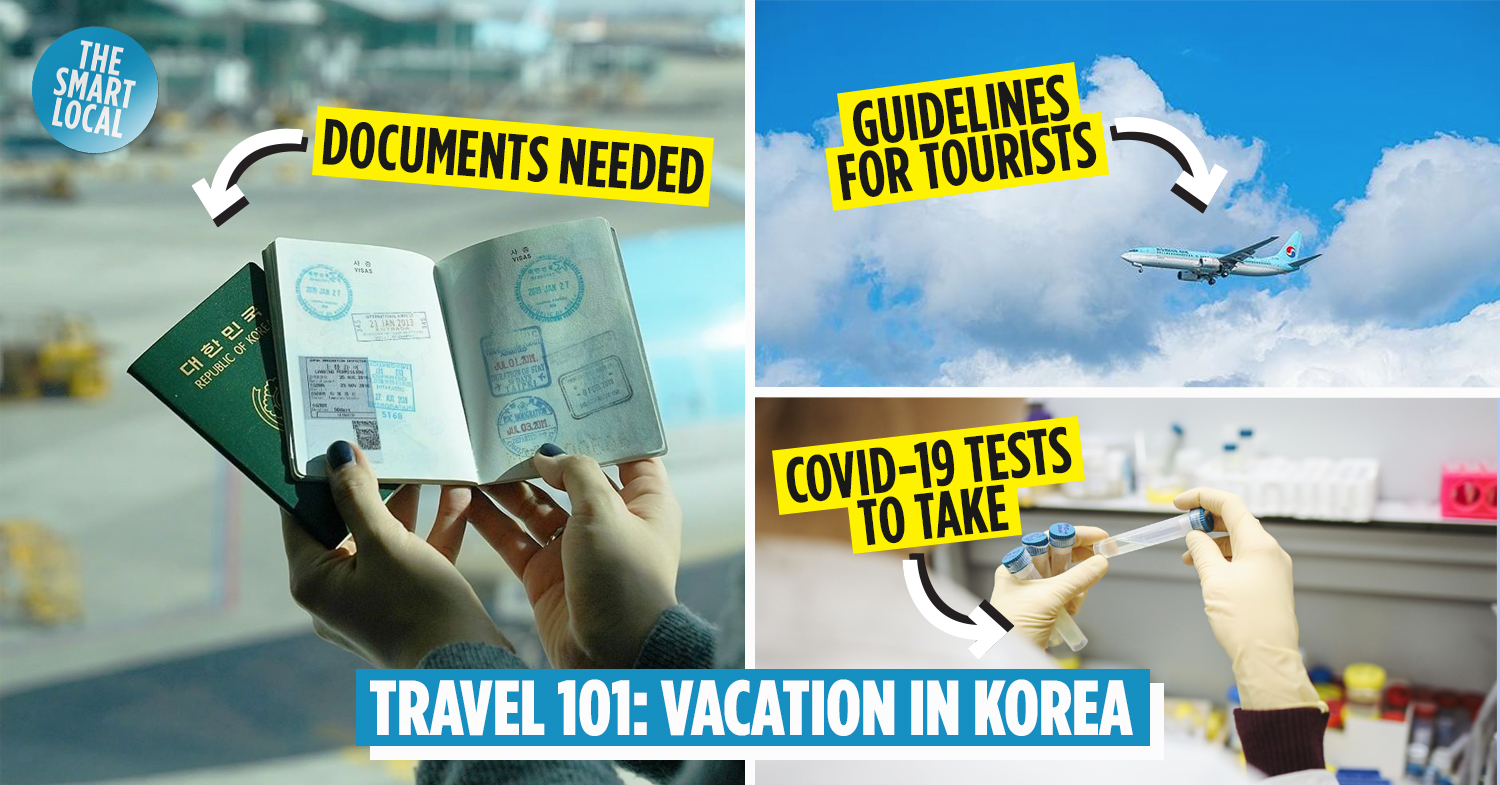
Guide To Travelling To Korea During The Pandemic: Visa Applications, Covid-19 Tests & Transportation
Guide to travelling to Korea
Many countries around the world are finally opening up their borders to travellers, and Korea is one of them. That said, Korea still has safety measures put in place to curb the spread of Covid-19. Before planning your itinerary and booking your flight tickets, refer to our guide on the things you must know before travelling to Korea .
Table of Contents
Preparations before taking your flight
After landing in korea, while holidaying in korea, for unvaccinated travellers, all you need to know about travelling to korea in 2022, covid-19 tests.

Update: As of 23rd May 2022, travellers from some countries can submit the results of their supervised ART (Antigen Rapid Test) results in lieu of a PCR (Polymerase Chain Reaction) test. The ART must be taken within 24 hours prior to departure. Note that this may not apply to all countries. Check with your embassy if this regulation applies to your country.
Only PCR tests based on DNA amplification methods, as well as supervised ARTs for eligible countries, are accepted for Covid-19 tests. Self-administered tests are not valid .
Travellers must submit a negative PCR test that was performed and issued within 48 hours before departure, or a supervised negative ART that was performed and issued within 24 hours before departure.
The Covid-19 test result must be written in Korean or English . Otherwise , a verified and official translation of the test result must be provided, along with a certificate of translation from a notary office, the Korean embassy, a certified translation officer, or a certified translator.
The document must show the following information:
- Traveller’s legal name
- Traveller’s date of birth or passport number or ID number
- Test method
- Negative test result
- Date of issue of result
- Name of testing centre
Travellers will need to submit a hard copy of their negative test results upon arrival in Korea.
Travellers who are unable to provide a hard copy will not be able to leave the airport. They will be transferred to a quarantine facility, where they will be charged for their stay, until they can submit a hard copy.
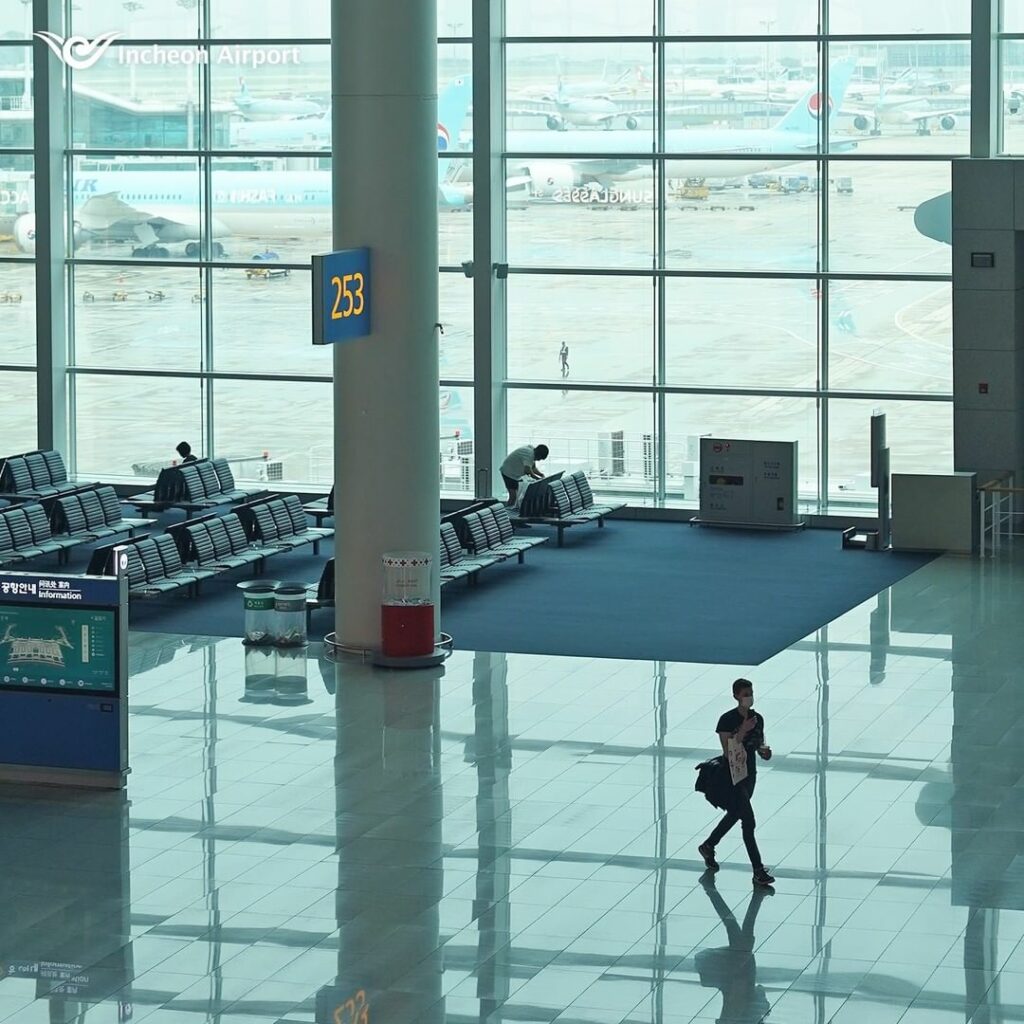
Travellers who don’t have a hard copy of the results on hand to turn in upon arrival can print it out after entry, either at the airport or while staying at a quarantine centre.
Travellers whose test results are unverified or in valid will be denied entry into Korea.
People who display Covid-19 symptoms such as fever and cough will also not be allowed on board , even if they are exempted from submitting a negative test result.
Q-CODE System
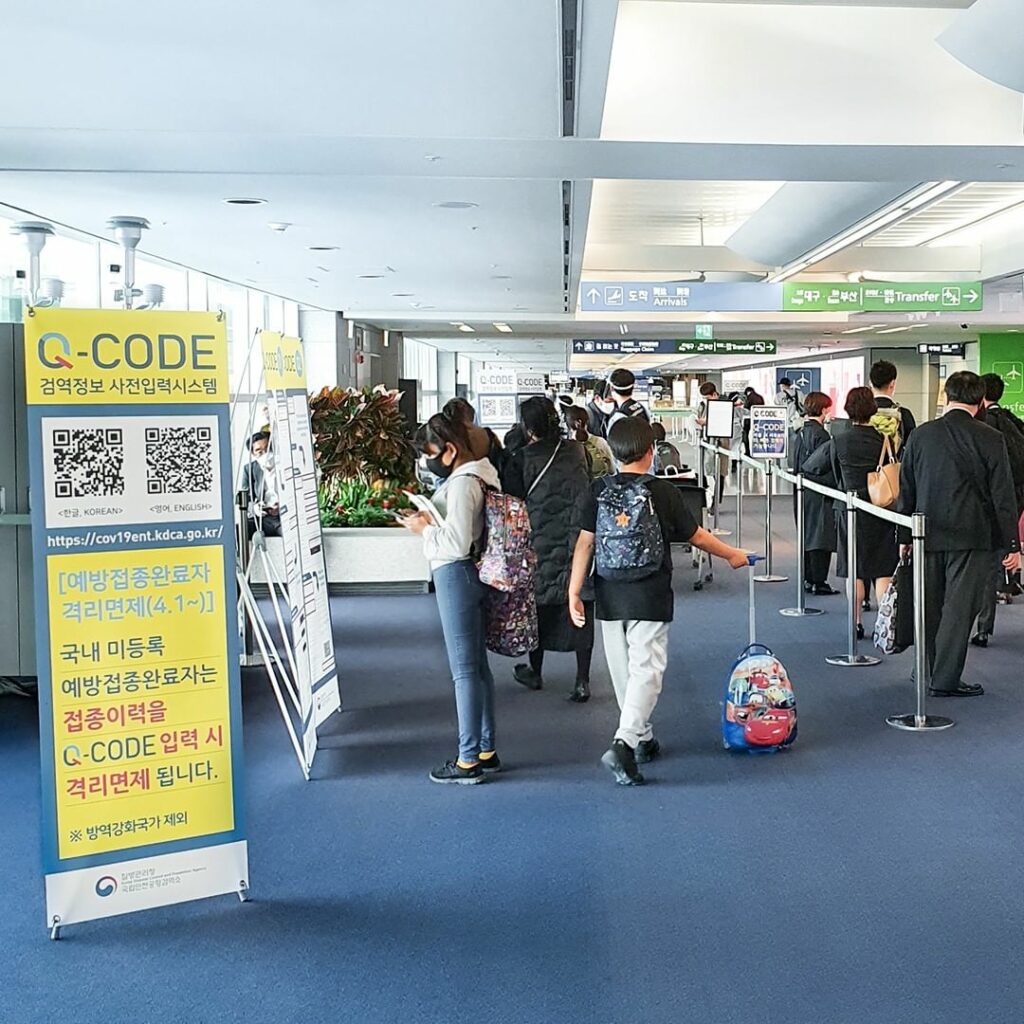
Q-CODE is a process established by the Korea Disease Control and Prevention Agency (KDCA) to make tourists’ entry into Korea more convenient.
Travellers will have to input their personal information regarding their trip and Covid-19 status into the system, which will be encoded as a QR code.
The information needed includes:
- Valid passport
- Valid email address
- Valid airline ticket
- Valid negative PCR test result
If available,
- Valid Covid-19 vaccination certificate
- Valid quarantine exemption issue
- Health condition information
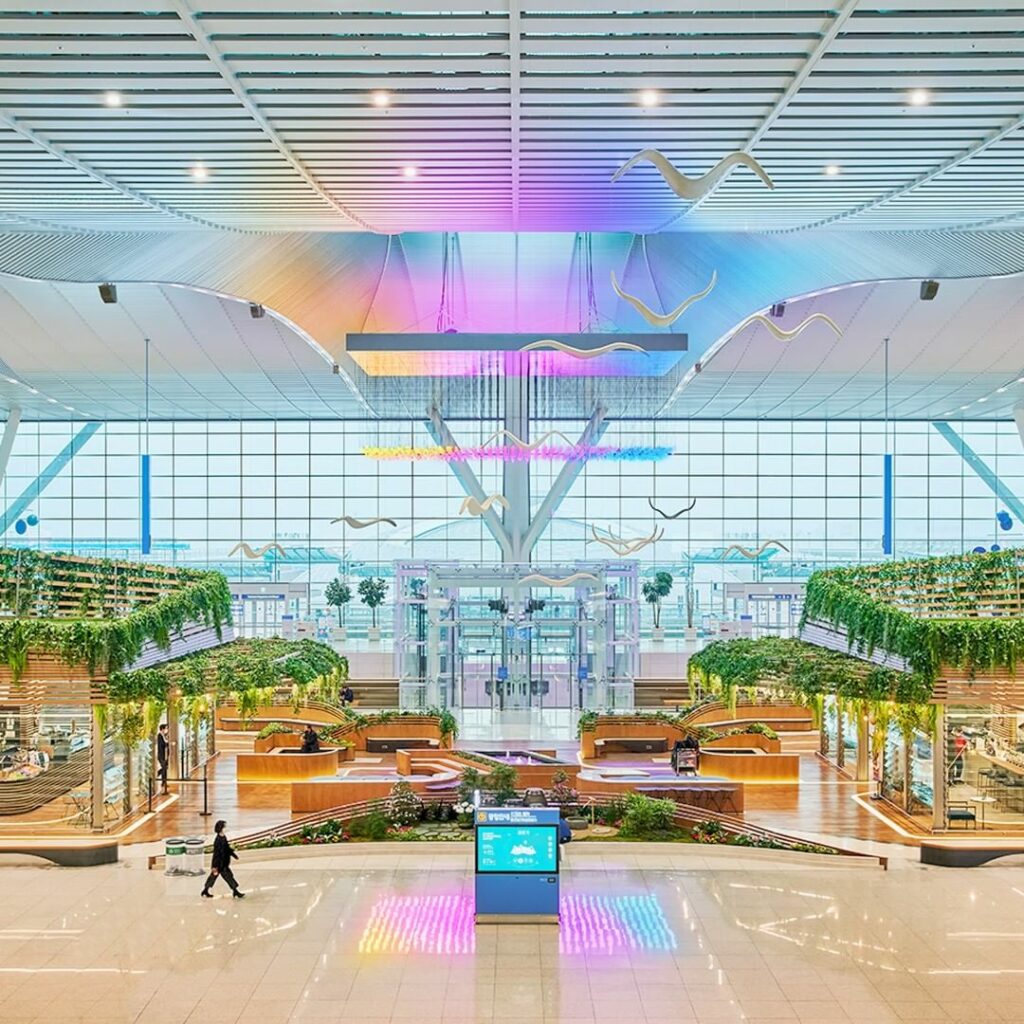
Travellers should take note that if they need to correct any personal information after submitting the form, they m ust re-do the application process to receive a new QR Code.
N ote that the Q-CODE does not guarantee quarantine and entry to Korea. Officers of quarantine and immigration control will have the final say on one’s entry and quarantine.
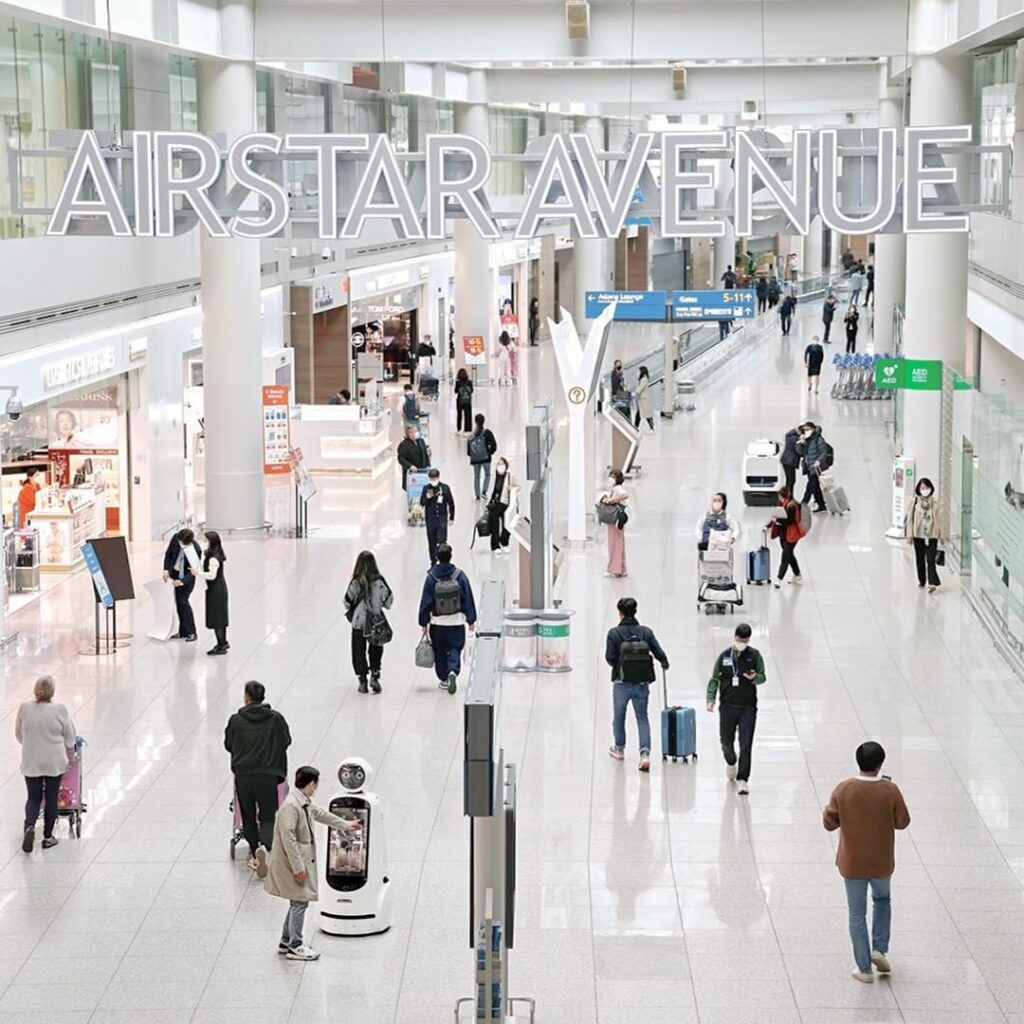
Inputting false or inaccurate information into the Q-CODE system could result in a penalty or denial of entry into Korea .
Travellers should submit their Q-CODE to the airline personnel upon boarding in their home country , and to the quarantine officer at entry inspection in Korea.
Visit the Q-CODE website for more information and to generate a QR-code.

Getting a Korean SIM card
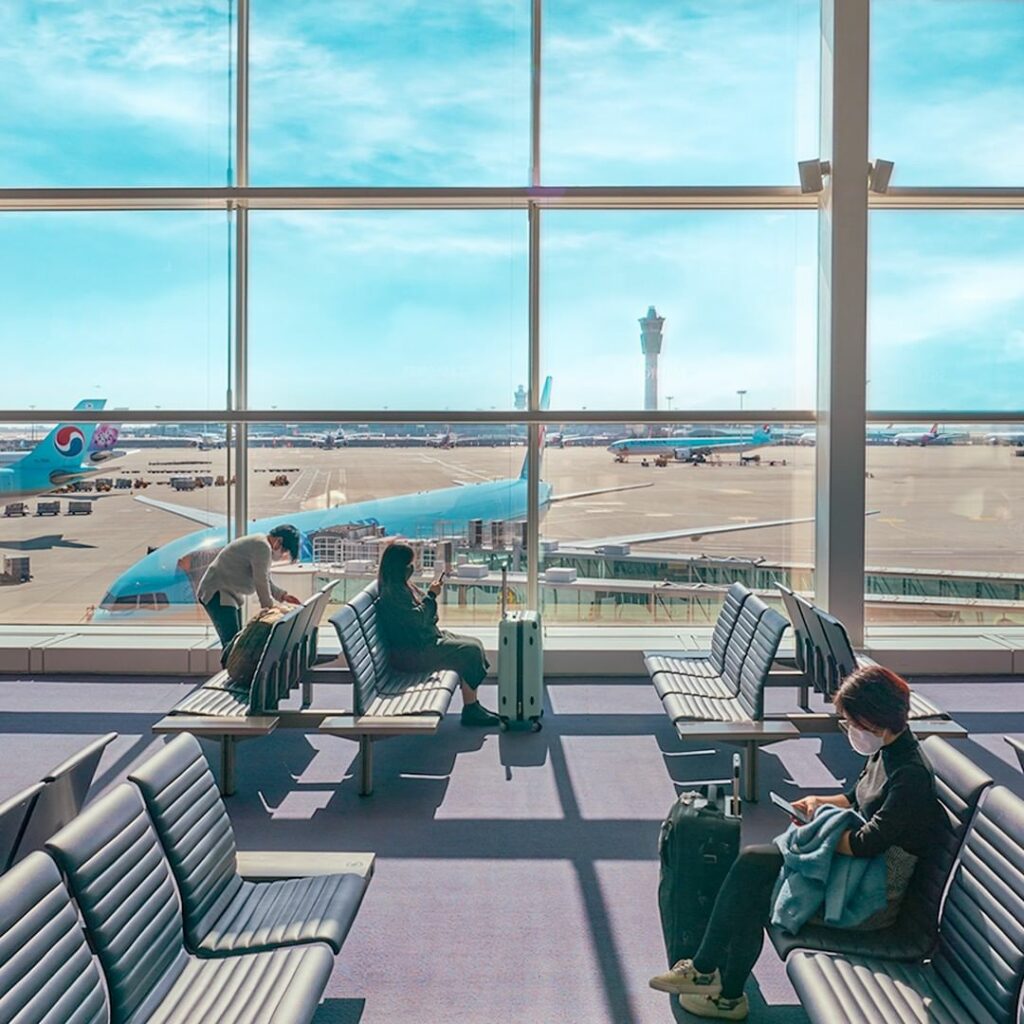
It’s best to have a Korean SIM card on hand before arriving in Korea as a Korean phone number is needed for official documents.
Ensure that your phone isn’t locked to a specific telecom company or country by contacting your cell carrier.
You can purchase a local Korean SIM card online or in Korea. There are three main mobile service providers in Korea : SK Telecom, LG (U-Plus/U+), and KT Olleh.

You can purchase SIM cards online through the two commonly used online SIM shopping websites, Korea SIM card and KT Roaming .
They sell various SIM cards from different telecommunications companies , a s well as Wi – Fi routers, which can be sent to your home or picked up at Incheon Airport.
You can also purchase SIM cards in Korea from convenience stores or at the airport’s roaming service counter after you’ve cleared immigration.
Applying for K-ETA

Since Korea has temporarily limited visa-free travel and the visa-waiver program due to Covid-19, travellers must apply for K-ETA (Korea Electronic Travel Authorisation) before entering Korea.
Only tourists from countries that qualify under the Visa Exemption Agreement with Korea can travel to the country for leisure reasons, for a period of up to 90 days. Travellers can check their eligibility via the Visa Navigator in the Korea Visa Portal website .
V isa-free travellers have to apply for K-ETA in advance.
But the good news is that from 1st June 2022 onwards, travellers from countries that are eligible for K-ETA will be able to enter the country without needing to apply for a visa.
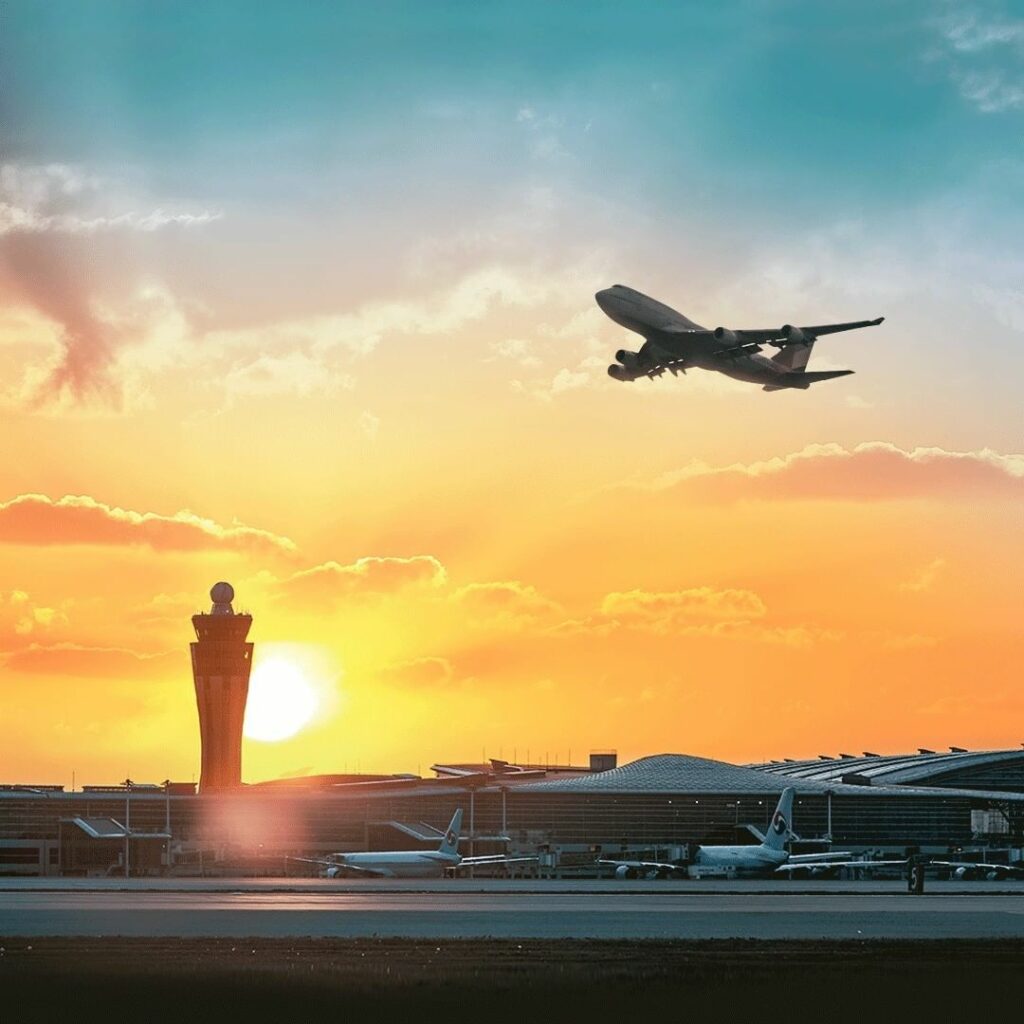
The K-ETA application should be completed at least 72 hours prior to boarding . Nevertheless, travellers should apply for the K-ETA with plenty of time in advance in case of delays .
Travellers can check their K-ETA application eligibility through the guide on their official website. As of 1st April 2022, the number of countries eligible for K-ETA application has increased from 50 to 96.
The a pplication fee costs KRW10,000 (~USD8.17) and is non-refundable even if the application is unsuccessful.
Travellers are required to apply for a new K-ETA if there are any changes to their personal information, including their name, sex, date of birth, nationality, passport information, health condition, and criminal record. Submitting false or inaccurate information may result in penalties or denial of entry.
They are also required to update any changes to the purpose of entry, address in Korea, and contact information through the K-ETA website.

Items needed for a K-ETA application are as follows:
- Passport picture
- Credit or debit card to pay the application fee
Travellers must note that the K-ETA is not a visa , and an approved application does not guarantee entry to Korea; a Korean Immigration Service Officer will have the final say on admission into the country.
A summary of the application process of a K-ETA can be found in the following flowchart:
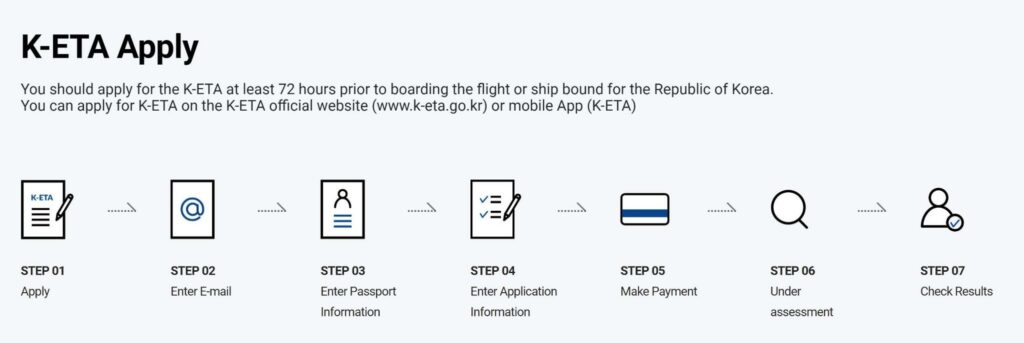
Travellers can also watch a tutorial video on how to apply for a K-ETA here:
Video credit: 출입국・외국인정책본부 Korea Immigration
Documents needed at quarantine checkpoint
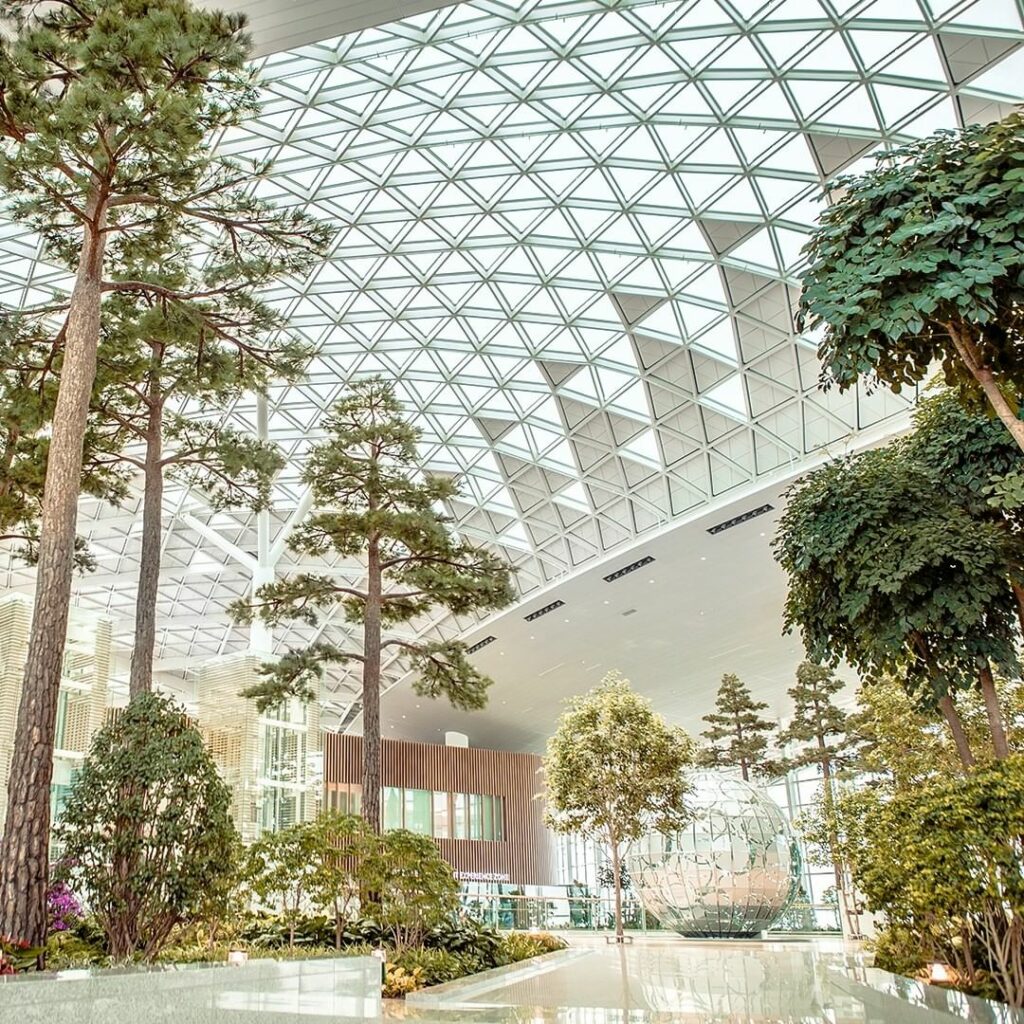
Travellers who have a n issued Q-CODE can use it in lieu of printed documents, but are still encouraged to have hard copies in case they are requested for verification.
These documents include a negative COVID-19 PCR test result, the health questionnaire and travel record declaration which should have been filled in onboard the flight, and passport .
Other documents that may be necessary include the quarantine exemption certificate and vaccination certificate .
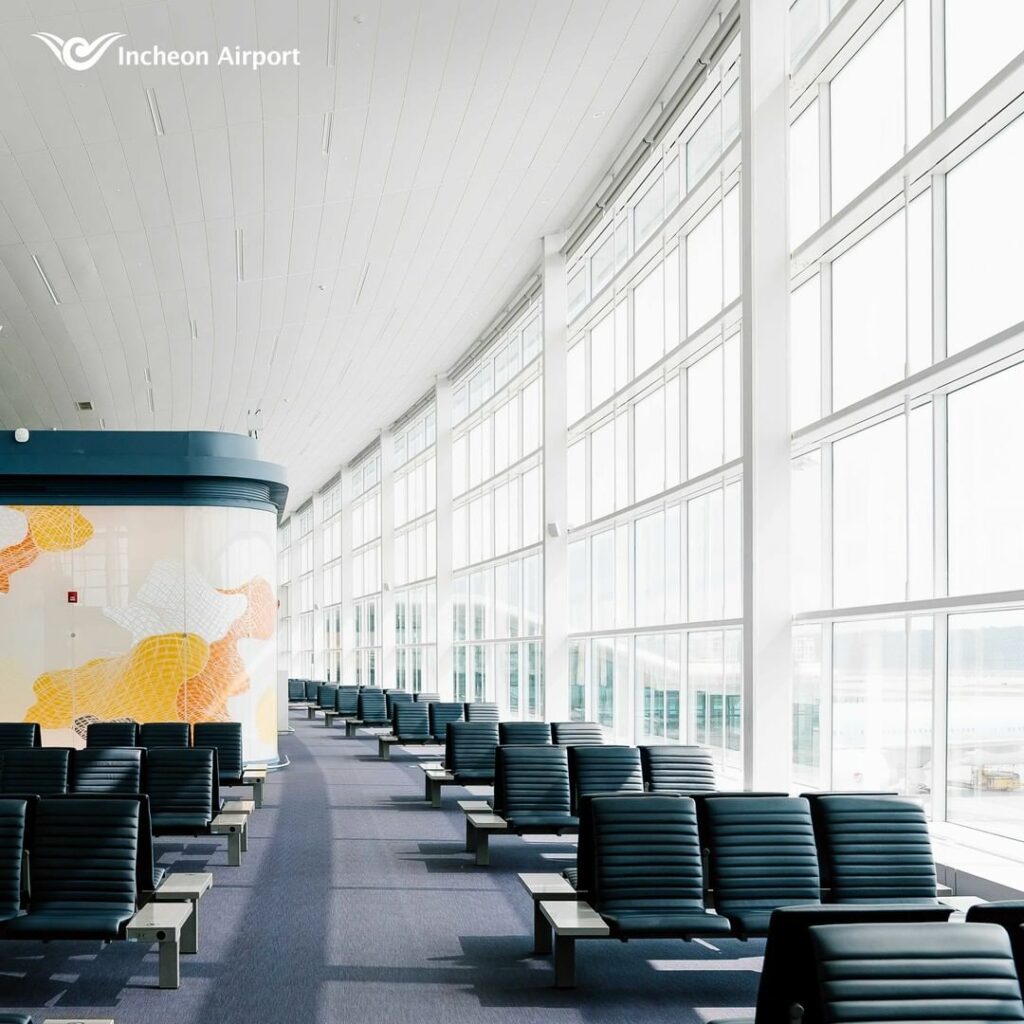
Effective from 1st June, travellers only need to take a PCR test within 3 days from arrival.
A PCR test costs KRW80,000 (~USD65.35) , and the testing centre is located at Incheon Airport Passenger Terminal 1 and 2 . The test result will be sent via SMS and email, which is why it’s best to have a Korean SIM card on hand .
Travellers need to bring their passport along for the testing.
More information on opening hours and exact locations can be found on Incheon Airport’s official website .
Travellers can also make reservations for a PCR test on the Safe2Go pass website .
In addition, PCR tests are available at a discounted price of KRW70,000 (~USD56.55) through the Korean National Tuberculosis Association (KNTA) , which is located at Seocho-gu, Seoul. Test results will be sent to one’s personal email address.

Travellers who show signs of a fever, coughing, difficulty in breathing, and other Covid-19 symptoms upon landing in Korea must take a PCR test at the Arrivals Hall or the quarantine facility.
If their test result is positive, they will be transferred to a hospital or residential treatment centre, depending on the severity of their symptoms.
Transportation to accommodation
As of 1st April 2022, exclusive modes of transportation for travellers, such as private hire cars, designated shuttle buses, designated KTX cars, and quarantine taxis , were suspended, but public transportation is still accessible for all.
These transportation modes include taxi, bus, train, and domestic flights.
Taxi transportation
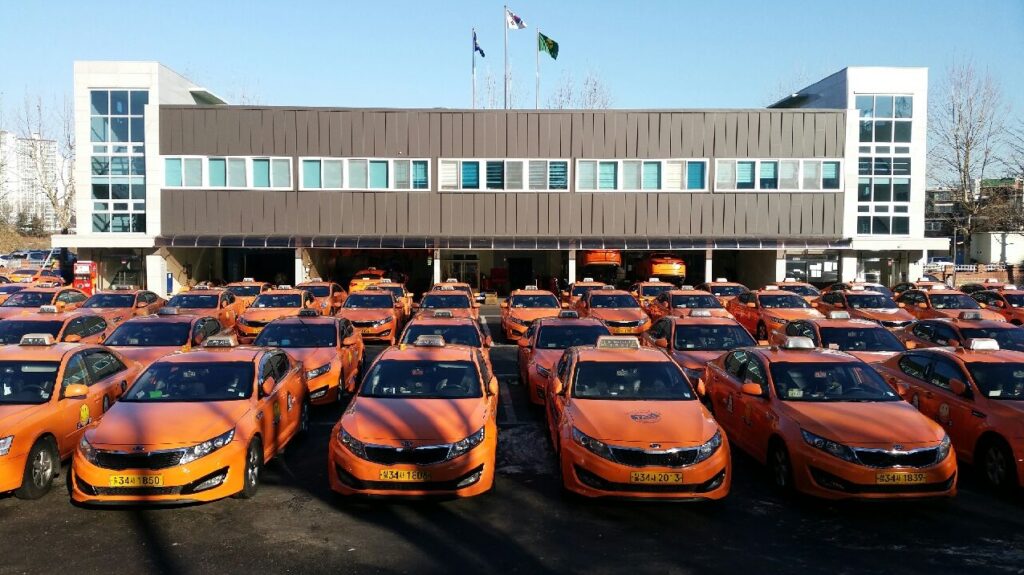
Travellers can hail a taxi at both major terminals in Incheon Airport.
There are four types of taxis available : international taxi, SEOUL SMART, first-class taxi, and regular taxi.
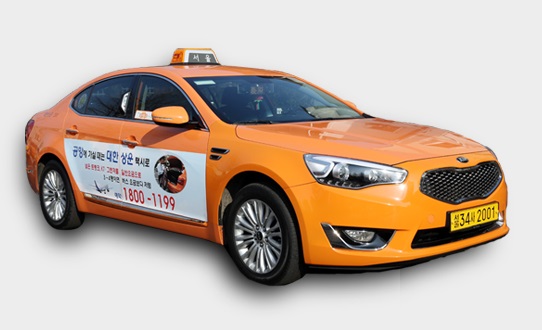
Regular taxis have a base fee of KRW3,800 (~USD3.10) .
There may be an additional late-night charge of 20% from 12AM to 4AM.
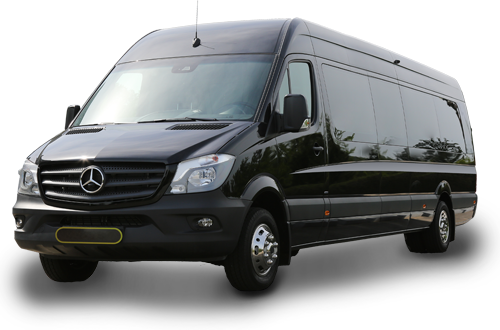
First-class taxis can fit up to nine passengers, and have a base fare KRW6,500 (~USD5.31) .
They can be hailed at stops 7C and 8C at Terminal 1, and stop 5D at Terminal 2.
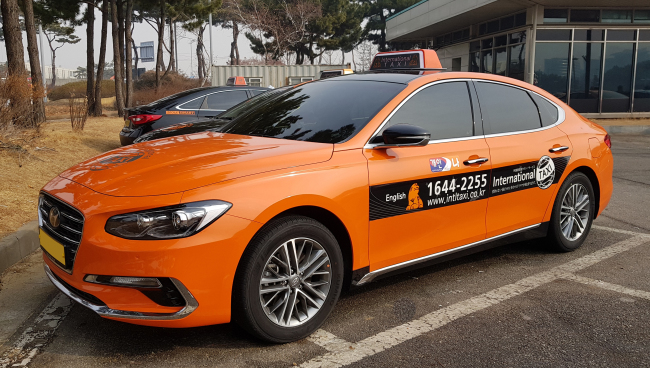
International taxis and SEOUL SMART taxis are transportation modes exclusive to foreigners as they are officially designated to provide foreign languages services. These taxis can be found at stop 4C in Terminal 1, and at stop 1C in Terminal 2.
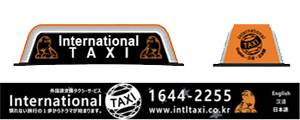
Pro-tip: International taxis and SEOUL SMART taxis can be identified by the words “International Taxi”, which are printed on the roof toplight and sides of the vehicle.
Travellers can call for an international taxi at 1644-2255, or make a reservation at least 24 hours beforehand on their website .
They can also call for a SEOUL SMART cab at 032-743-2357.
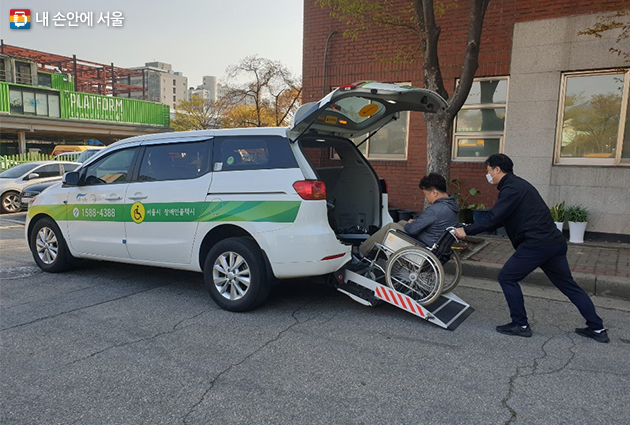
Disability-accessible taxis can be reserved by calling 1577-0320 for an Incheon Transit Corporation Disabled Reservation Taxi, or 1588-4388 for a Seoul Facilities Corporation Disable Reservation Taxi.
Call-van transportation
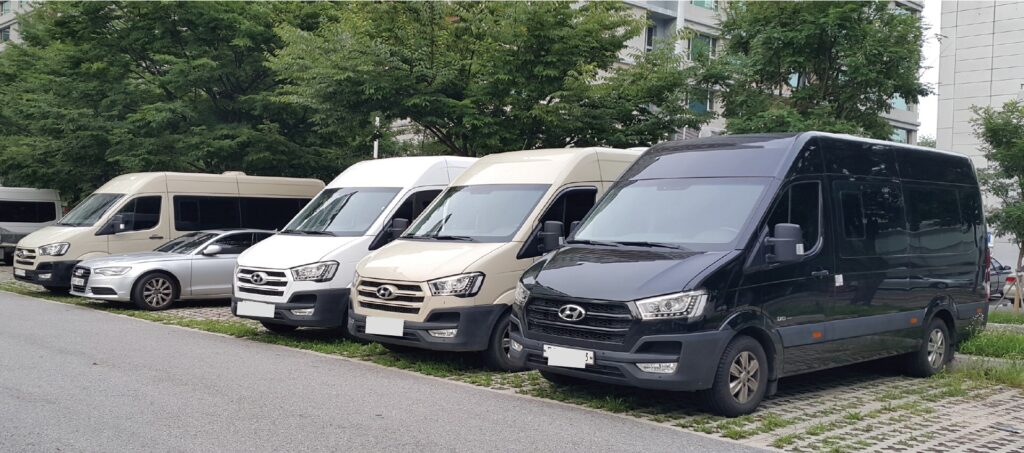
Travellers with a lot of luggage can ride a call-van, which can carry up to five passengers carrying 20kg of baggage per person. In Korea, a call-van refers to a private hire minivan.
The fee for call-vans is charged by metre and may vary based on the amount of baggage you have, and they operate from 8AM to 9PM all year round. Do note that in some cases, you will have to negotiate with the driver for the fee before you board.
Bus transportation
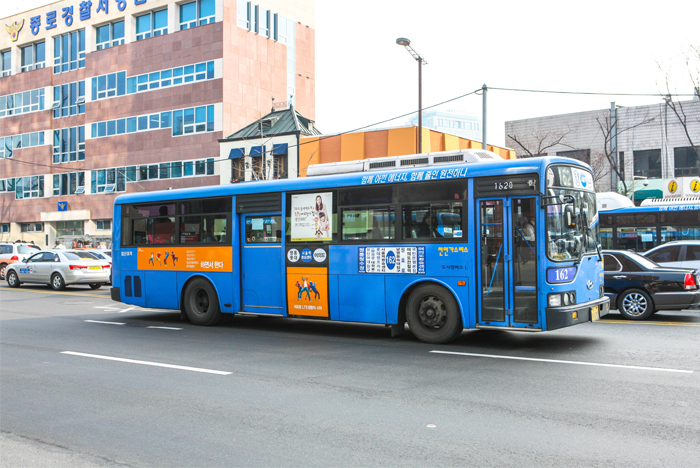
The airport bus service provides rides to major areas in Seoul and other provinces such as Gyeonggi, Jeolla , and Gangwon.
Bus fares range from KRW1,300 (~USD1.06) to KRW37,600 (~USD30.71) , depending on distance and travel time.
For more information on the bus stops and buses, check Incheon Airport’s official website .
Tickets can be pre-booked through Tmoney’s website and the Integrated Express Bus website .
Airport Railway Express (AREX)
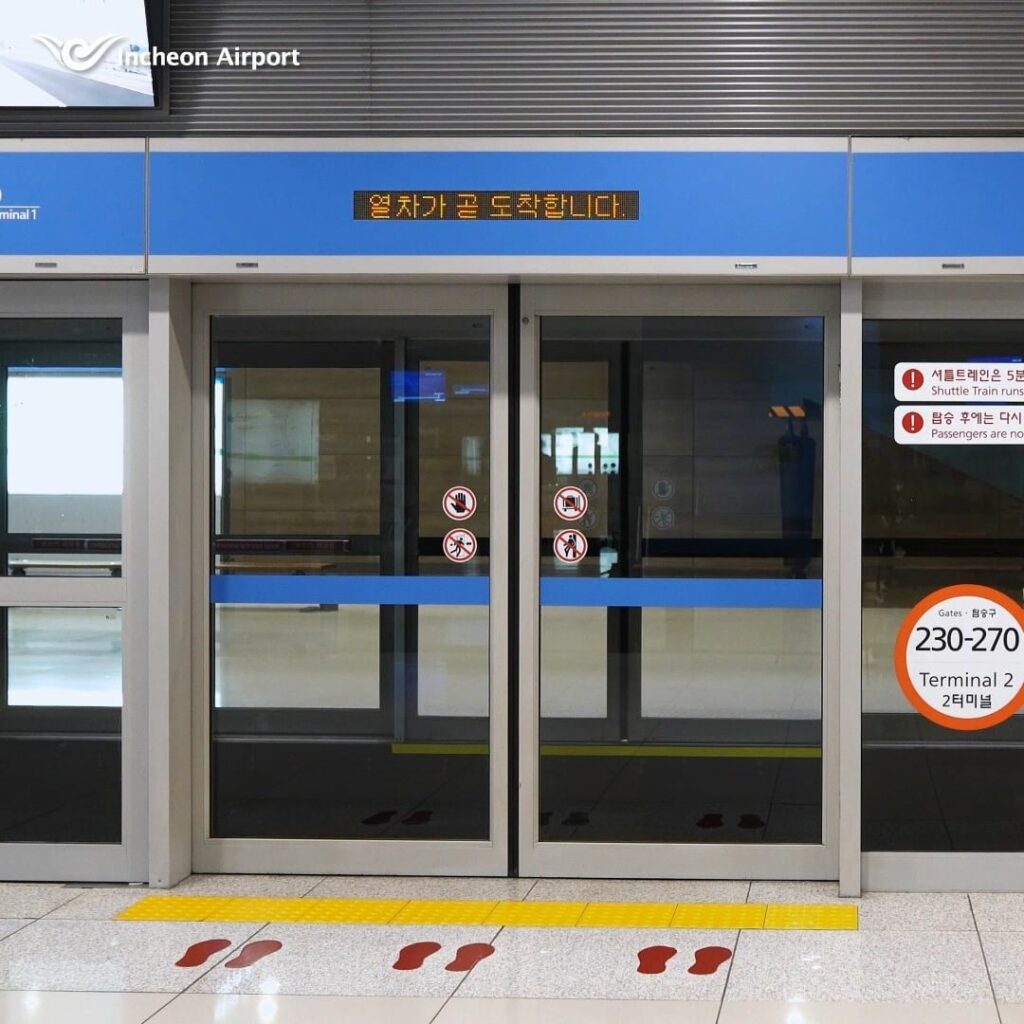
There are two types of trains offered by AREX – the express train and all-stop train.
The express train goes non-stop between Incheon Airport and Seoul Station, while the all-stop trains are commuter trains that stop at all 14 stations between Incheon Airport and Seoul Station. Due to the pandemic, the express trains only arrive every 30 minutes to an hour. The all-stop trains leave every five to ten minutes.
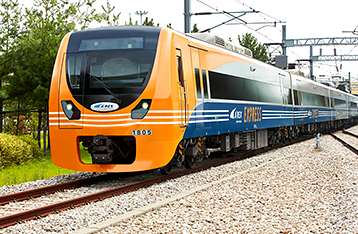
The journey time from Incheon Airport to Seoul Station on an express train takes anywhere from 43 to 51 minutes .
An express train ticket costs KRW9,500 (~USD7.76) for adults and KRW7,500 (~USD6.13) for children.
Tickets for express trains can be bought at the Information Centre in both terminals of the airport, or at an auto ticket machine. Payment can be made with cash or credit card.
Various domestic and foreign credit cards, including VISA, Mastercard, JCB, Diners Club International, American Express, and UnionPay, can be used to purchase a ticket.
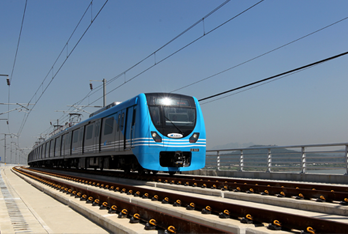
The fare for all-stop trains is calculated by adding the basic fare and the distance fare, and can range from KRW1,250 (~USD1.02) to KRW4,750 (~USD3.88) .
Passengers can take the all-stop train with three types of cards : the single journey card, transportation card, and commutation ticket.
These cards can be purchased from most convenience stores, and can be topped up at ticket vending machines and customer centres in train stations.

Testing Covid-19 positive during stay
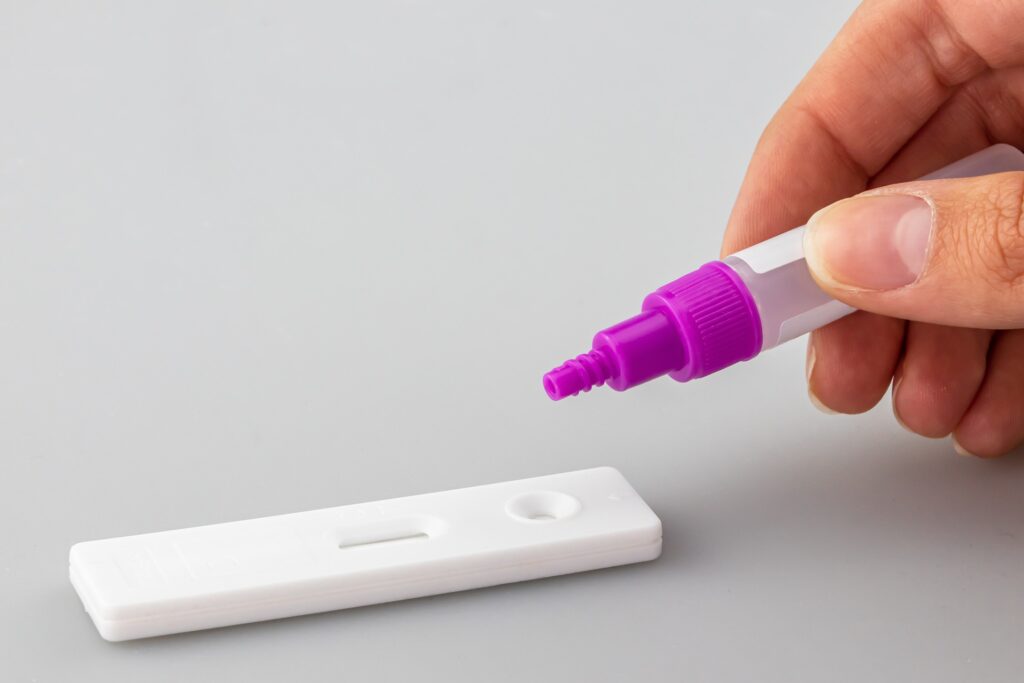
Update: As of 23rd May 2022, those who enter South Korea no longer have to take an ART within six to seven days of their arrival, although it is recommended by the government.
Travellers who suspect themselves to have Covid-19 symptoms should call 1339 for inquiries, take a self-administered ART or visit a nearby medical clinic or COVID-19 testing centre .
You can also call the 1330 Korea Travel Hotline (82-2-1330) for more clarification.
If you are Covid-19 positive, refrain from going outside and call a health centre or the 1339 call centre first for counselling. Foreign language services are available.
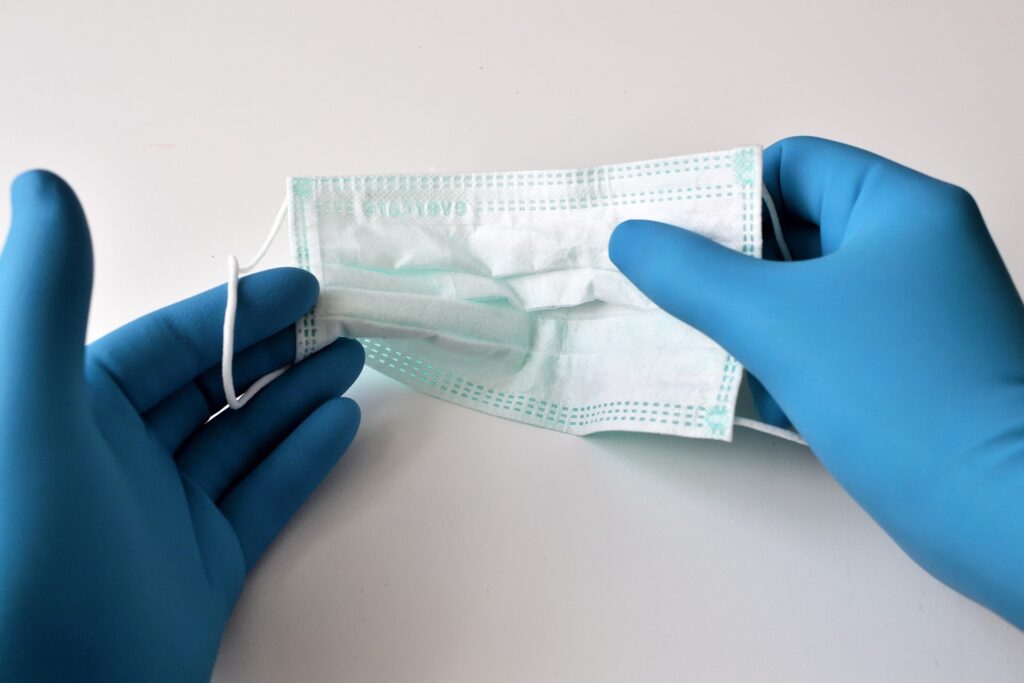
Follow the instructions provided by the 1339 call centre, wear a face mask , and visit a medical institution that operates a screening station . Upon arrival, let the medical staff know that you’re a tourist.
Suspected cases will be moved to an isolation area within the screening site for a supervised Covid-19 testing. If you test negative, you have to undergo 14 days of mandatory isolation from the last date of contact with a confirmed case. If the test is positive, the appropriate treatment will be provided depending on your symptoms and condition.
Korea’s measures to tackle the pandemic
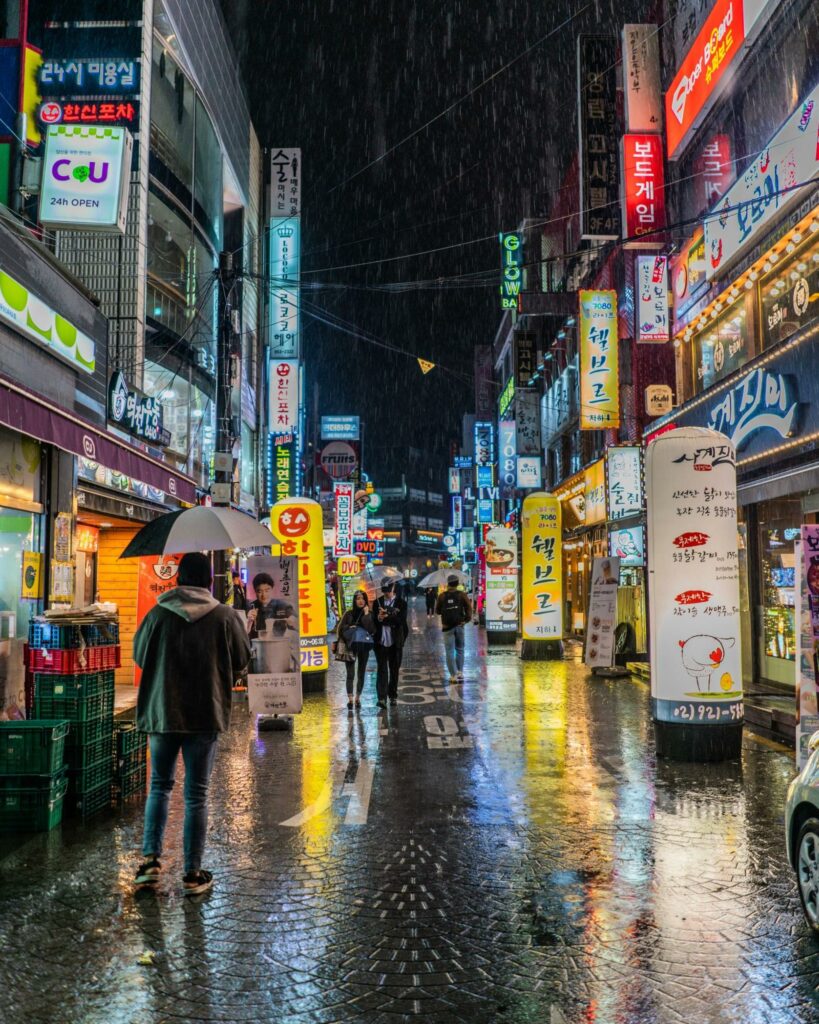
As of 19th April 2022, the midnight curfew for most businesses has been lifted, and private gatherings no longer have a limit of 10 people.
Starting from 25th April 2022, eating in cinemas and other indoor public facilities, including stadiums, is allowed.
However, you must still wear a mask at all times when onboard all modes of public transportation, and when not consuming food in an eatery. You must also wear a mask indoors at all times, and as well as outdoors if the place is too crowded and safe-distancing measures are not possible.

It is no longer a must to scan any QR codes, show a vaccination pass, or measure body temperature to enter attractions or eateries.
However, do remember to comply with temperature checks and hand-sanitising procedures, where required by owners.
We recommend checking Naver Maps for the opening hours and dates of specific facilities and attractions, since these may fluctuate due to updated safety measures.
Places to stay
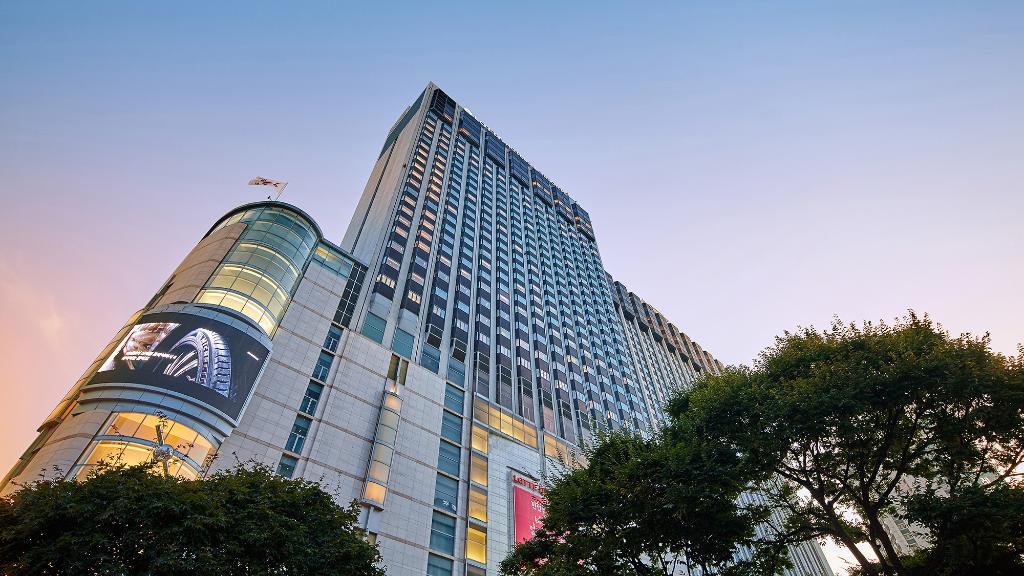
Most accommodations, including hotels, hostels, and homestays such as Airbnb, are available for tourists.
However, as of 10th December 2020, travellers must present their passport or a travel document to the owner of the accommodation facility, in accordance with rules set by the Korea Immigration Service.
A breach of this requirement will merit a fine up to KRW500,000 (~USD408.44) to be imposed.
If you are unable to get vaccinated due to medical or personal reasons, note that even if you have a valid negative PCR test result upon arrival in Korea, you still have to test negative in a temporary residential facility and quarantine for a week . The expenses for staying in this quarantine facility has to be fully covered by you.
Travelling amidst the pandemic is a new normal that all of us have to get used to. From multiple Covid-19 tests to all sorts of restrictions, these safety measures may seem overwhelming at first. However, these guidelines are necessary to ensure everyone’s health and safety. Just take note of the steps in our guide to travelling to Korea in 2022, and have fun planning your trip!
Also check out:
- 11 cherry blossom cafes with stunning views
- 20 things to know before travelling to Korea
- GS25 launches virtual convenience store
- Kakao Friends X Care Bears collab
- 6 romantic holidays celebrated by couples in Korea
Cover image adapted from: @incheon_airport , @koreanairworld and Polina Tankilevitch
- 13 Korean Dating Reality Shows That Will Reawaken Your Dormant Love Cells
- 28 Historical Korean Dramas That Withstood The Test Of Time, Unlike Joseon Exorcist
- 34 Thriller Korean Dramas To Watch When You’re Done With Romantic Shows
- 20 Short Korean Dramas That You Can Finish In A Day For Those With Commitment Issues
- Transit Love 2 Cast Facts: Age, Occupation & Trivia About The Trending Korean Dating Show
Step-by-Step Guide to the Korean Visa Application: K-ETA Explained
Navigating South Korea's K-ETA system is crucial for travelers in 2023. Uncover the essentials of this mandatory travel authorization in our comprehensive guide
Exploring South Korea can be a dream come true for many travelers. But before you pack your bags, there's an essential requirement to address: the K-ETA. With South Korea's tourism booming in 2023, understanding the South Korea travel requirements is crucial.
What is K-ETA?
The Korea Electronic Travel Authorization, or K-ETA, is a mandatory digital authorization for tourists hailing from visa-free countries. To put it into perspective, it applies to a whopping 112 countries, out of which 66 enjoy visa-free status and 46 have a visa-waiver agreement with Korea.
W hy is it Important?
Before boarding a plane or ship bound for Korea, having a K-ETA is non-negotiable. If you belong to the above-mentioned countries, you must apply for K-ETA via the official website or its dedicated mobile application.
The Menace of Scam Sites
Given the rising popularity of South Korean destinations, scam websites mimicking the official K-ETA site have emerged. They prey on unsuspecting travelers by charging exorbitant application fees. The genuine K-ETA fee? A reasonable 10,000 won (roughly USD 9).
Getting Your K-ETA: A Simple Guide
- Keep a valid passport and an active e-mail address handy.
- A portrait photo is a must. For PC applications, upload the photo; for mobile applications, a quick snap with your smartphone will do.
- A nominal fee of 10,000 won (around USD 9-10) is all it takes. You can clear this via a credit or debit card.
K-E TA Application Process at a Glance
- Start early! Submit your K-ETA application at least 72 hours before your departure.
- Patience is key. The processing time can stretch to around 72 hours. To avoid any travel hiccups, ensure you apply in advance.
- Traveling in a group? Group applications are accepted, with one person able to apply for up to 30 members.
- In-transit passengers, rejoice! You don't need a K-ETA if you're only stopping over and not entering Korea.
Temporary Exemption of K-ETA for 22 countries
In honor of the "Visit Korea Year 2023-2024" initiative, there will be a temporary waiver of the K-ETA (Korean Electronic Travel Authorization) for residents of 22 countries and regions. This exemption is effective from April 1, 2023, until December 31, 2024 (KST).
Please be aware that citizens from these 22 countries and regions are still eligible to apply for a K-ETA, for which the application fee is 10,000 KRW per individual (approximately 9-10 USD; extra charges may apply). Travelers with a K-ETA will not need to fill out an arrival card upon landing in Korea.
The 22 countries and regions that qualify for this temporary K-ETA exemption
Australia, Austria, Belgium, Canada, Denmark, Finland, France, Germany, Hong Kong, Italy, Japan, Macao, Netherlands, New Zealand, Norway, Poland, Singapore, Spain, Sweden, Taiwan, the United Kingdom, and the United States (including Guam).
Enjoying the content and want to support my journey?
Consider dropping a few bucks in the ' Coffee Fund ' tip jar 😃 Treat me to a coffee today, and let's keep exploring together!
Seoul Housing 101: Where to Rent and How to Navigate the Market
How to get around in south korea: essential public transport tips, planning your dream korean adventure: travel tips you need to know.

Learn To Legally Lower Your Taxes, Watch Video🎥
Tourist Visa In Korea: A Simple Guide

Picture this: vibrant Seoul nights, tranquil temple visits, and spicy kimchi feasts.
Ready to pack your bags for an unforgettable Korean escapade?
Before you board, let’s unravel the tapestry of securing a tourist visa for Korea.
Let’s dive in!
How Is Tourism Impacting The Korean Economy?
Sights and attractions in Korea collectively are the reason why over 17.5 million visitors arrived in South Korea in 2019. This figure is 14% higher compared to the previous year’s number, making it one of the top visited countries in Asia.
Travel and Tourism added significantly to the country’s economy, contributing 4.16% to the overall GDP of the country in 2019.
However, most international travelers embarking on their Korean adventures will have to obtain a tourist visa .
In this extensive guide, we will walk you through the intricate details of securing a tourist visa for South Korea. From the eligibility criteria to the visa application process, while also providing you with valuable tips to ensure a successful application.
While we are on the topic, it is important to mention that it is easier for citizens of the developed nations to obtain a hassle-free visa, which is mostly on arrival.
Nations like the EU Member States, Australia, New Zealand, The United Kingdom have a visa waiver agreement with the Republic of Korea.
Other nations which do not have a visa waiver agreement with Korea include countries like The United Arab Emirates, Canada, Russia, Bahrain and others.
However, this in no way implies that it is difficult for the citizens of these countries or other countries to obtain a Korean visa.
One thing to be noted here is that the famous Schengen visa is not required to enter Korea. The visa required to set foot in Korea is issued and processed by the Government of Korea. Schengen is only required to enter most of the European states.
What Is the Korean Tourist Visa?
Like any country that offers different types of visas for different people, depending on their purpose of visit, Korea also follows the same route.
Visas granted for educational purposes have different requirements, terms and conditions comparatively to a businessman heading to Korea for trade and investment.
Similarly, a visa granted for the purpose of sightseeing is different. A Korean tourist visa, often referred to as a C-3 visa, is the key that unlocks the doors to South Korea for travelers from around the world.
This visa allows its holder to explore the breathtaking landscapes, vibrant city life, rich cultural heritage, yummy street food, access to the world’s best skincare that South Korea offers, for a specified duration, usually up to 90 days.
Whether your purpose is sightseeing, visiting your friends or family, or experiencing the diverse culture that Korea offers, a tourist visa is your magic wand to a memorable journey through this captivating country.
What Is The Eligibility Criteria For Korean Tourist Visa?
Before embarking on the visa application journey, it is vital to determine whether you meet the eligibility criteria for a Korean tourist visa.
Requirements are set by the Korean Government and individuals going ahead with the process should be aware of the fact that the rules and conditions are the same for all.
Being fair and unbiased to every nationality is the primary goal of the Korean Government.
The criteria typically includes:
Valid Passport
Your passport should have the validity of at least six months beyond your intended departure date from South Korea.
Passport should not expire and should be renewed by the relevant authorities prior to applying for the visa.
Financial Capability
You must demonstrate the financial means to cover your stay in South Korea.
This involves providing your recent bank statements, financial sponsorship letters, or other evidence of sufficient funds.
Intention To Return
You will need to convince the visa granting authority and establish your intention to return to your home country or residence after your visit ends.
This can be exhibited through ties to your family, employment proof, property ownership, or educational commitments.
Clean Criminal Record
For visiting any country in the world, no matter developed or developing, even the ones plagued with crimes, one must submit proof of the fact that they are civilized, law abiding citizens of their own countries.
Furthermore, having a clean criminal record is necessary and relevant. Any history of serious criminal offenses may impact the visa application and will most probably result in the visa denial.
Flight Itinerary And Accommodation
Present a confirmed flight itinerary to and from South Korea, as well as all the relevant details of your accommodation for the duration of your stay.
Purpose Of Visit
State clearly the purpose of your visit as tourism. Whether you plan to explore historic sites, indulge in cultural experiences, great food or visit friends and family, your intent should align with tourism .
What Are The Types Of Korean Tourist Visa?
Korean tourist visas are broadly divided into two types:
The C-3 Visa
This is a short-term tourist visa . It’s the most common type of tourist visa and is suitable for travelers planning to stay in South Korea for a short period of time, typically up to 90 days.
It is ideal for tourists, those visiting friends or family, or individuals seeking to explore the country’s vibrant culture.
C-4 Visa
This is the group tourist visa . The C-4 visa is designed for group tourists who are part of an officially recognized tour group.
If you plan to explore South Korea as part of an organized tour, this visa is the one to pursue.
What Is The Korean Tourist Visa Application Process?
Obtaining a Korean tourist visa involves a structured application process, which can be outlined as follows:
Download And Complete The Application Form
Access the visa application form from the official website of the Korean embassy or consulate in your home country.
It is important to fill out the form accurately, ensuring there are no errors, and no relevant information is missed out.
Gather Required Documents
Collect the necessary supporting documents , including your passport, passport-sized photos, proof of financial capability, flight itinerary, accommodation details, and any additional documents specified by the embassy or consulate.
Schedule An Appointment
Some Korean embassies or consulates may require applicants to book an appointment for visa submission. It is crucial to check the specific requirements of the embassy or consulate in your area and follow their procedures.
Submit Your Application
Attend the appointment (if required) or visit the embassy or consulate during their designated working hours to submit your application. Ensure that all documents are neatly organized and presented according to their guidelines.
Pay The Visa Fee
Pay the visa application fee, which varies depending on your nationality and the type of visa you are applying for. Keep the receipt as proof of payment.
Visa Interview (If Required)
In some cases, applicants may be called for a visa interview. During the interview, be prepared to answer questions about your travel plans, intentions, and other relevant details.
Wait For Processing
The processing time for a Korean tourist visa can vary, ranging from a few days to several weeks. Patience is essential during this period.
Collect Your Visa
Once your visa application is approved, collect your visa from the embassy or consulate. Before leaving, double-check all visa details for accuracy.
How Long Can You Stay In Korea For With A Tourist Visa?
With a Korean tourist visa, you can typically stay in South Korea for a period of up to 90 days (about 3 months).
This 90-day period is often referred to as the “duration of stay.” It begins from the date of your entry into South Korea and is indicated on your visa sticker.
It is important to abide by the allowed duration of stay specified on your visa. Overstaying your visa can result in legal consequences, including fines, deportation, and potential difficulties obtaining future visas.
If you plan to stay in South Korea for longer than 90 days or for purposes other than tourism, you will need to explore other visa options, such as a work visa, student visa, or long-term residency visa, depending on your specific circumstances and intentions for staying in the country.
However, the requirements and documents needed for those visas would differ from that of a tourist visa.
What Is The Visa Fees For A Tourist/Visitor Visa?
The visa fee for a Korean tourist visa can vary depending on the nationality of an individual and the type of visa they are applying for.
As of September 2021 , the standard visa fee for most nationalities was around 60,000 Korean Won (KRW). However, this fees is tentative and can change from time to time.
There may be variations based on your nationality, visa category, and the specific embassy or consulate where you apply.
To get the most accurate and up-to-date information on visa fees for your specific situation, visiting the official website of the Korean embassy or the consulate in your home country is recommended.
They typically provide detailed information on visa requirements and fees for applicants from different countries. Additionally, you can contact the embassy or consulate directly for clarification on the current visa fees and payment methods.
How Long Does It Take To Process A Korean Short Stay Visa For Tourism?
The processing time for the C-3 tourist visa can vary depending on several factors, including your nationality, the specific embassy or consulate where you apply, and the time of year.
However, here are some general guidelines:
Normal Processing Time
In many cases, the normal processing time for a Korean tourist visa is approximately 5 to 10 business days.
This means that if you submit a complete and accurate visa application, you can expect to receive a decision within the time frame mentioned above.
Peak Seasons
During peak travel seasons, such as the summer months and major holidays like Christmas, Easter and others, visa processing times may be slightly longer due to a higher influx of applications.
It is advisable to apply in advance during these periods to ensure that your visa is processed in time for your intended travel dates.
Visa Interview
If the embassy or consulate requires a visa interview as part of the application process, this may add extra time to the processing.
Visa interviews are typically scheduled in advance and can take place before a decision is made.
Complex Cases
If your visa application is considered more complex due to specific circumstances or additional document requirements, it may take longer to process.
For example, if you have a history of visa denials or if you’re applying for a long-term visa, it may require additional attention and thought and will take more time.
What Are The Tips For A Successful Korean Tourist Visa Application?
Securing a Korean tourist visa can be a straightforward process if you follow these essential tips:
Apply In Advance
Commence the visa application process well in advance of your planned travel dates to account for processing time and potential delays.
Provide Accurate Information
Ensure that all information provided on your application form aligns with the supporting documents and is entirely accurate .
Financial Documentation
Submit clear and comprehensive financial documents to demonstrate your ability to support yourself during your stay in South Korea.
Travel Itinerary
Craft a well-structured travel plan that outlines your plans and intended destinations within South Korea according to your interests and wants.
Avoid Overstaying
Respect the validity period of your vis a and adhere to the allowed duration of stay. Overstaying can result in legal consequences and future visa denials.
Visa Exemptions
Investigate whether your country is eligible for a visa exemption or visa waiver program, as these options can simplify your travel plans.
Consult The Embassy/Consulate
If you have any doubts or questions about the application process, do not hesitate to reach out to the Korean embassy or consulate for guidance and clarification since they would have all the adequate information and the ability to answer any question that you might have in a detailed manner.
Conclusion
You’re now equipped to embark on your Korean journey with the right visa in hand. From palace tours to K-pop concerts, a realm of experiences awaits. Your Korean odyssey begins now!
Journey Jumpstart!
But wait! There’s lot more that you might be interested in following:
- Types Of Visas In Korea
- Tax Refund In Korea
- Temporary Residence In Korea

+971 55 879 4786
- Agents Enquiry
- Login / Signup

- Eligibility
- how to apply
South Korea Visa Price
When planning a trip to South Korea, it's important to consider the cost of getting a visa. Fortunately, the visa price for South Korea is relatively low compared to other countries.
The South Korean government offers two types of visas: single-entry and multiple-entry. The single-entry Visa allows travellers to stay in the country for up to 90 days. This visa costs between US $30 - US $50, depending on where you apply.
The multiple-entry Visa is more expensive, but it allows travellers to enter and exit South Korea multiple times during the duration of the Visa, which can be up to 1 year. This Visa typically costs between US $50 - US $80.
If you plan to stay in South Korea for more than 90 days, you must get a residence permit. This permit costs around US $70 and must be applied for at least two months before entering South Korea.
In addition to the cost of a visa, travellers will also need to pay a handling fee when applying for a visa. This fee can vary from country to country, so it's important to check with your local embassy or consulate for the exact amount.
Overall, getting a visa to South Korea is relatively inexpensive, especially compared to other countries. With careful budgeting and planning, you can ensure you have enough money for a South Korea Visa.


UAE: Travelling to South Korea? How to get a tourist visa
F rom Kpop music to hydrating skincare and delicious snacks, the Korean craze has taken over. Whether you plan to attend your favourite band's concert or enjoy the scenic views of South Korea's many islands, travelling to the country from the UAE has become an easy process.
Travellers going for tourist purposes must apply for the C-3-9 tourist visa. This type of permit is also known as the 'short term tourist visa'.
This visa can be issued in single entry, which is valid for three months, double entry, which is valid for six months and multiple entry, which is valid for five years.
From required documents to booking an appointment, here's a complete guide for residents planning a trip to South Korea.
After submitting the e-visa form, applicants have to book an appointment with the Consulate General of the Republic of Korea in Dubai. This can be done online through the '365 Overseas Korean Portal' (www.g4k.go.kr).
They can do so by clicking on the 'reservation to diplomatic mission'. Applicants are required to become a member or log in and then based on the availability, book an appointment.
After the appointment has taken place, it usually takes up to 14 business days for the processing. Applicants can check their visa status online. After the visa has been approved, it can be collected from the Korean embassy.
The visa fees for most nationalities is Dh160 for single entry, Dh280 for a double entry visa and Dh360 for a multiple entry visa for less than 90 days.
Those applying for more than 90 days have to pay Dh240 for a single entry visa, Dh280 for a double entry visa and Dh360 for a multiple entry visa.
For certain nationalities these costs may differ. These are mentioned on the consulate's website.
It is important to note that only cash is accepted for payment.

- Foreign Affairs
- Multicultural Community
- Environment & Animals
- Law & Crime
- Health & Science
- Cryptocurrency
- Thoughts of the Times
- Today in History
- Tribune Service
- Blondie & Garfield
- Letter to the Editor
- Travel & Food
- People & Events
- Around Town
- Fortune Telling
- Shows & Dramas
- Theater & Others
- Korean Storytellers

gettyimagesbank
Korea will ease visa requirements for foreign researchers as part of efforts to attract more talent in the field of science.
The Ministry of Justice said on Monday that it will loosen the requirements for D-2-5, a type of visa issued to researchers at universities, and for E-3, a visa for people invited by a public or private institution to “engage in the field of natural science or in high technology research and development.”
The D-2-5 visas have so far been issued only to researchers with a graduate degree or undergraduate students who are invited by one of only a few schools that specialize in science, such as KAIST or UNIST.

The ministry said more schools will be permitted to invite undergraduate students from overseas, saying those included in the top 200 of Times Higher Education World University Rankings or the top 500 of QS World University Rankings will soon be able to take advantage of the visa.
Thanks to the policy change, foreign researchers without a graduate degree will be allowed to study at several more schools here, including Seoul National University, Yonsei University, Sungkyunkwan University and Korea University, according to the latest rankings.
Previously, at least three years of work experience was required for E-3 visa candidates who do not have a doctorate. The ministry said such experience would not be required for those who have earned their master’s degree from one of the highly ranked universities or those who have participated in publishing influential academic papers.

World Water Day 2024
Busan World Team Table Tennis Championships Finals
Super Bowl 2024
Welcoming Lunar New Year around world
Daily life in Afghanistan under Taliban rule


IMAGES
VIDEO
COMMENTS
1. Check for visa requirement based on the nationality of your passport. 2. If a visa is required, you must apply for a visa based on the purpose of your visit. 3. Entrants with a visa waiver must apply for K-ETA and receive approval 72 hours prior to departure. Select the nationality of your passport.
South Korea's tourist visa application process is partially online. You will have to fill out an online form but you will have to visit the embassy in person after to submit your documents. Below is the general process of applying for a South Korean tourist visa at the embassy. Step 1: Complete the e-form online.
** On November 17, 2008, the Republic of Korea joined the U.S. Visa Waiver Program (VWP). As a result, on reciprocity, U.S. citizens can visit the Republic of Korea without a visa for duration of up to 90 days or less if the purpose of the trip is for tourism, business meeting, attendance at a conference or visiting families or relatives.
90 days or less Single-entry visa. USD 40. 91 days or longer Single-entry visa. USD 60. Double-entry visa usable up to 2 times. USD 70. Multiple-entry visa. USD 90. Despite the standard visa fee regulations, fees may be differently applied according to international practices, the principle of reciprocity, national agreements, or in the cases ...
Visa Fees Y 101; Entry & Stay Y 101; Find a Diplomatic Mission Y 101; Application. ... Work and Visit (Expired visa) (H-2-7) Diplomacy · Official Business. ... REPUBLIC OF KOREA. ALL RIGHT RESERVED. ※ Visa portal is optimized for IE7, Chrome, Firefox, Safari, Opera browsers and 1024*768 pixels.
Short-term Group Tourist (C-3-2) Visa for Chinese group tourists who can apply for their Visa through a designated travel agency ... (C-1) and Short-term General (C-3) Visa who are citizens of countries that have multiple-entry visa agreements with Korea. Visas issued at the discretion of the head of a Korean diplomatic mission abroad, such as ...
To check the applicable fees for the type of visa application and services, please click on the relevant topics below. Visa Fees Visa fees change semi-annually (every 6 months) according to the exchange rate set by the government of the Republic of Korea. Therefore, the new visa fees will be applied for applications received after JUL 1, 2024 at KVAC and will be valid until DEC 31, 2024.
The tours range in price from free to $150 golf courses although most are cheaper than $5. They range from 1 hour to 5 hours in duration. ... Benefits of South Korea tourist visa. South Korea visa may not be the strongest, but it does come with VISA-FREE access to a handful of countries. In 2024, you can travel to about 8 countries with a South ...
South Korea Family Visit Visa (for more than 90 days) ... Any other documents depending on the specific visa; South Korea visa fees. The South Korea visa fees are as follows: Visa Type: Fee: Single-entry visa (up to 90 days) US$ 40: Single-entry visa (longer than 90 days) US$ 60:
Korea tourist visa price. The cost of a Korean tourist visa is USD 40. However, additional charges for credit card usage and electronic payment services may apply if you make the payment through the Visa portal. Please note that the application fee is non-refundable even if the application is denied.
A Korean Electronic Travel Authorization (K-ETA) may be required for some nationalities, and a visa is needed for others. To check your eligibility and find out how long you can stay in South Korea, please use the official K-ETA Application Eligibility Guide. Make sure to apply for a K-ETA at least 72 hours (or even earlier) before travel.
The steps include: Online Application: Your sponsor must complete the online South Korea Visa application form. Payment: Pay the required fee for the application. Document Submission: Attach the necessary documents for the South Korea visa, depending on the purpose of your visit.
Visit the official Korea Visa portal to fill out the form. ... South Korea Visa Fees. The processing fees for South Korean visa applications are US $40 for a single-entry visa with a stay of fewer than 90 days and US $60 for a single-entry visa with a stay of 91 days or more. However, visa fees may differ because of the principle of reciprocity ...
A South Korea tourist visa, also known as a C-3 visa, allows individuals to visit the country for tourism or leisure purposes. This visa is typically valid for up to 90 days and is suitable for short-term trips, such as vacations, sightseeing, or attending cultural events.
Tourist visa to South Korea. A tourist visa to South Korea is granted for the purpose of tourism and leisure or visiting relatives in South Korea and is valid for 90 days from the date of issuance (single and double entry; make sure your visa covers your travel dates) or 1-5 years for multiple entry.Nationals from countries eligible for Electronic Travel Authorisation may apply for K-ETA instead.
3. Fill out your arrival card on the plane. As you near Korea, the flight attendants will hand out arrival cards for all non-Korean nationals to fill out. The arrival card lists your name and passport details along with information about your flights into and out of the country.
Tourist Visa (C-3): Ideal for travellers exploring South Korea or visiting relatives. Fees vary based on nationality and agreement between countries but generally range from $40 to $90. Business Visa (C-2/C-4): For those engaging in business-related activities. The cost is similar to the tourist visa. Student Visa (D-2/D-4): Necessary for ...
Since Korea has temporarily limited visa-free travel and the visa-waiver program due to Covid-19, ... PCR tests are available at a discounted price of KRW70,000 (~USD56.55) through the Korean National Tuberculosis Association ... You can also call the 1330 Korea Travel Hotline (82-2-1330) for more clarification.
The Korea Electronic Travel Authorization, or K-ETA, is a mandatory digital authorization for tourists hailing from visa-free countries. To put it into perspective, it applies to a whopping 112 countries, out of which 66 enjoy visa-free status and 46 have a visa-waiver agreement with Korea.
The visa fee for a Korean tourist visa can vary depending on the nationality of an individual and the type of visa they are applying for. As of September 2021, the standard visa fee for most nationalities was around 60,000 Korean Won (KRW). However, this fees is tentative and can change from time to time.
Citizens of 90 countries need to obtain a visa before visiting. Electronic Travel Authorization (K-ETA) has a maxiumum stay of 30 days. Sticker Visa has a maxiumum stay of 90 days. Visa Free has a maxiumum stay of 3 months. Travellers can apply for a visa online when travelling to South Korea. South Korea eVisa is available online for Travellers.
Average Trip to Korea Cost in 2024. An average one-week trip to Korea for two people will cost around $4,900: Average Accommodation Cost: $100 per night. Average Flight Cost: $1,300 per person. Food, Drink & Activities: $100 per person, per day. Transportation: $200 total.
When planning a trip to South Korea, it's important to consider the cost of getting a visa. Fortunately, the visa price for South Korea is relatively low compared to other countries. The South Korean government offers two types of visas: single-entry and multiple-entry. The single-entry Visa allows travellers to stay in the country for up to 90 ...
After the visa has been approved, it can be collected from the Korean embassy. The visa fees for most nationalities is Dh160 for single entry, Dh280 for a double entry visa and Dh360 for a ...
Korea will introduce a visa for foreign nationals who want to receive training in K-pop, choreography, fashion modeling and other categories of Korean popular culture, the governme...
The DOT has participated in Arabian Travel Market 2024 in Dubai, United Arab Emirates and the Seoul International Travel Fair 2024 in Seoul, South Korea last month amid is push to make Philippines ...